#i just like when class characters are related and their stories intersect :)))
Explore tagged Tumblr posts
Text

Yayyy!! Yippee!! I finally get to make one of these!! Art without the text under the cut and some long-winded elaborations:

How long I've been playing: well, it hasn't been a straight 11 years, rather off and on - but I have drawings of these guys dating back to when I was 14, so I'll give it to me. And man I had no business reading the fanfics I was reading back then It's also crazy how this was a super influential media for me in so many ways. It's the reason I ever made a tumblr, it changed the direction of my drawings for a long while, my broken sense of humor (gmod animation memes and yt poops were the brainrot back then), tf2 Sniper changed my god damned gender (rather, it was the inspiration for me to start socially transitioning at 15). This is part of my personal lore that I tend to not admit to 😓
Your main: I've always been completely ass at the game, and I can play flexibly, but I enjoy playing Sniper, and more recently as Heavy. Whenever I'm sitting around somewhere, occasionally throwing sandwiches and attracting Medics, I feel like this:

Favorite character: When I was younger it was definitely Medic, and I think you can tell that he's still up there based on how much I've drawn him! However, since getting back into it, I've felt quite a shift in focus towards Heavy, very strongly. It's unfortunate that he's side-lined in a lot of fanwork, and I think I'm also complicit in this so far - but for me it's cuz, how tf2 works is that it's going to prioritize humor over character and consistency haha, and Medic is just so loud and insane that he's really easy to make fun stuff with. Heavy is a more serious and grounded character, not to say that he's not funny or that he doesn't have his own cartoon slapstick moments! But that aspect of him is what is really really intriguing to me. I love his quiet, stoic, and intimidating character, I like how loud and boisterous he is when filled with bloodlust in contrast! I love his bird story and him getting into wrestling as a child from Poker Night. I love his back story setting, there's so much to extrapolate from a young boy in Russia growing up during WWII, what his parents must have been through before that from the aftermaths of the revolution, all the way to his fathers execution and his imprisonment. I love his strong relationship with his family, his role as an older brother, as a protector, as a man - the way that he performs these roles - and because I personally see him as bisexual - how his orientation intersects with all that! He is incredibly fascinating to me and I wish that he was played around with more to see a lot more corners and angles of these things that I listed! There's way more that I want to say here too but this is getting very long 😅
Character I relate to: It's so interesting that a lot of the characters have very strong, tho maybe dysfunctional, families. Heavy, Demo, and Sniper in particular really speak to me in that relation. From Heavy being an eldest brother (I am also an eldest sibling) the parentification that comes with that, especially with him probably being like 10 years older than his sisters from the looks of it. Demo and Sniper both struggle living up to their parents expectations (although there's a lot of love there from everyone), being disappointments in one way or another (not gonna deep dive into that lol), and the general alienation both of them feel. From Sniper not knowing why he's not like other Australians to Demo being "a black Scottish cyclops." And well, I'm Filipino, I'm queer, and mentally ill so - there's a lot to project there!
Class you want to play as: I find Medic incredibly stressful to play as but I find the idea of battle medics incredibly funny. However I usually find myself rushing around madly trying to cater to everyone, and I'd like to just not give a shit and just start stabbing people with a saw lol
Favorite ship: "I just like the dynamic" - The dynamic:

No but fr, they're really compelling to me, I'd probably need a longer more thought out post as to what I like about them and I was already going crazy up there ^ Overall tho I like that they're practically built for each other in terms of mechanics, really plays into my desire to spiral into intense codependency haha. I also think that Medic's drive to cheat death and hide behind meat shields plays really well into Heavy's desire to be a meat shield and a protector, and how nice it is in turn, that Medic can grant this man who's been around death, starvation, and war invulnerability. (He outsmart boolet, yknow?) They're also depicted together a lot and I like how much they enjoy each others company, and bring a lot of joy to each other. It's beautiful to me :'^)
Character you like to draw: What can I say! Medic is handsome! He is very fun to draw and easy to make memes and shit posts out of!
462 notes
·
View notes
Note
Hey there. I recently moved to Gotham for job related reasons. Thought I had a pretty good handle on the whole hero and villain thing down here, the Bats and their various enemies are the only ones anyone seems to talk about anyways.
So imagine my surprise when one day I'm driving back home and something that I can only describe as some kind of yellow and red demon lands right on top of my car hood before getting back up and leaping into the sky. look up and see what I think were some other ugly monsters or something firing down some magic stuff at em.
Got back home as quick as I could after that, asked a few guys I know at work what the hell it was about but they got nothing, but one of em pointed me to your blog. So Historian, you happen to know anything about yellow and red demons in Gotham?
First off you should probably contact your insurance about the car. Unlike the jokes made by people who don't live in superhero cities, or the fearmongering of idiots, insurance DOES cover "acts of superhero" especially if you live in Gotham. If they give you a hard time, reach out to the Thomas and Martha Wayne Foundation. Bruce Wayne LOVES thumbing his nose at oligarchs in these sorts of situations. As for the demon you saw, you are VERY lucky you only got a glancing blow from whatever the hell Etrigan got wrapped up in this week.

(A CCTV image showing Etrigan bursting forth from a burning warehouse)
Now you'll have to forgive me I only took a few occult related classes in college for my degree and my knowledge of the Arthurian Period is limited to how it intersects with my specialties but the basic rundown is this. Etrigan is a demon. Like from Hell (or some version of the Christian vision of same, how you feel like dealing with this information is down to your personal theology). He's on the higher rank of mid class demon from what I know, not any kind of ruler, lord or arch but a caste of warriors known as "Rhymers" (due to their distinct habit of every statement they utter having to be rhymed). (All of the information below has been run past my occult colleagues, I have those now, to make sure I am not summoning anything or offending anyone who would want to turn my intestines into snakes) Etrigan was something of a Monkey King figure, born as first son to the Arch-Demon Belial and the Serpent Queen Ran Va Daath he was too powerful to control even for Hell's bureaucracy and so he was placed under the control of the mortal wizard Merlin (who is his younger brother, long story, go read a grimoire). It was during the Fall of Camelot that Etrigan was bonded to the dishonored knight Jason Blood, I actually already did a dive on that some weeks back. Blood and Etrigan have been stuck together for the following millennia, Etrigan's instincts as a born engine of destruction kept in check by Jason Blood's honorable character meaning that most often the Demon has been set against creatures of his own domain in defense of mankind. Blood currently works as an Occultist in Gotham though he's very much a jet setter and can be spotted just about anywhere in the world there's mystery afoot. The advice I would give is DO NOT seek out any more information about this in person. If ANYTHING was left on your car (blood, fangs, scales, scraps of cloth) that you KNOW come from Etrigan or the other demon or can't otherwise identify. I have been tasked with giving you some instructions by my said occult colleagues. 1. Gather up as much of the mass of the object as you can.
2. Burn it, if you are religious, pray while you burn it. In fact, praying during every step of this disposal process couldn't hurt.
3. Gather up the ashes, wrap them in a burlap sack tied off with a leather cord (yes the material is important).
4. Place (DO NOT THROW) the bag beneath the current of cold, running water.
5. Wait for any bubbles or any motion within the bag to stop, anything that's drowning in there is not your responsibility.
6. Gently release the bag and do not take your eyes off it until it either hits the bottom or vanishes from sight.
7. Scoop up the water in a metal container with your RIGHT hand
8. Douse the spot you picked up the material from with the water. Do not touch, sit on or otherwise interact with the spot until the water has naturally dried.
9. If at ANY POINT these processes do not go as planned. If you notice signs of your car or home being rearranged without your knowledge. Or otherwise sense anything amiss, contact a licensed occultist from www.Shadowpact.org and follow any further instructions TO. THE. LETTER
10. Make a mental note that you do NOT fuck around with magic. Magic is NOT a joke or a scam. And the people who deal with magic are VERY well educated in how not to get themselves killed. YOU ARE NOT.
#dc#dcu#dc comics#dc universe#superhero#comics#tw unreality#unreality#unreality blog#ask game#ask blog#asks open#please interact#worldbuilding#etrigan#the demon#jason blood
28 notes
·
View notes
Text
Koisuru Scramble - Chapter 4
Writer: Nishioka Maiko Translation by: Sophie // Proofread by: Mirei
NOTE: I EXPLICITLY PROHIBIT USAGE OF ANY PART OF MY TRANSLATIONS ON ANYTHING THAT RELATES TO AI.
This story is fully voiced in-game! You should read while listening to it~
Episode 65: Farewell Marble
Hajime: Ah, Nakaouji-kun!
Eiki: …Hi there.
Hajime: Don't you just hate how it’s been pouring since this morning~? I do. It’s so humid.
Oh, right. I wanted to talk about our after-school meeting later. Say, when the rain finally stops, do you mind if we—
Eiki: ………
Hajime: …? Nakaouji-kun, is everything okay? You look like you're not in the mood. Did something happen?
Eiki: …Let’s stop these after-school meetings.
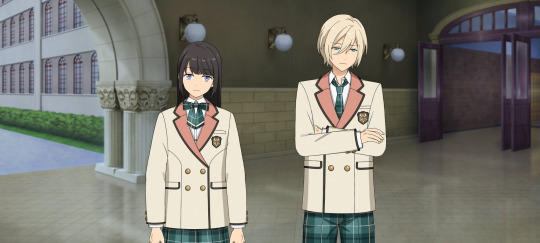
Hajime: Huh…? What do you mean…?
Eiki: I’m sorry. I think it’s better for you to not be with my company anymore. Please forget all of it — about everything until now and everything about me. Forget it all.
I’ll be on my way now.
Hajime: Hey, wait—!
Eiki: ………
Hajime: Wait, Nakaouji-kun! I’m begging you, please stop right there!
Eiki: ………
Hajime: Hey�� What did you mean with what you just said? Forget about everything? I can’t understand why I should.
Was it something I did? Please tell me.
Eiki: No… It’s not you, Koino-san. It’s me.
Hajime: ‘It’s me’? Please, make me understand. Please, face me properly.
Eiki: It would’ve been probably better if… I didn’t notice that.
I’m sorry… I don’t think I’ll be the one who can make you smile. I’m sure there are other people out there who can give you greater happiness than I could ever do.
…Bye bye.
Hajime: Huh…?
………
(...My happiness?)
(Why? You haven’t even properly told me what your words actually mean... I still can't understand. You didn’t even give me a chance to talk. Are you really deciding to end things on your own?)
Even though we still talked just fine and had fun until yesterday?
(...He really wants us to pretend that nothing happened, huh.)
(Even the fact that we met at all.)
(I mean, of course. What was I thinking? We are not on the same level, after all. His life and mine weren’t even meant to intersect at all.)
(That’s why it’s okay... It’s much better to pretend that all of that didn’t happen in the very first place.)
(If any, I should be thankful for it! All those times we spent together felt like I was in a fairytale, even just for a little while.)
(So thank you…)
[ Her voice starts breaking. ]
(Bye bye…)
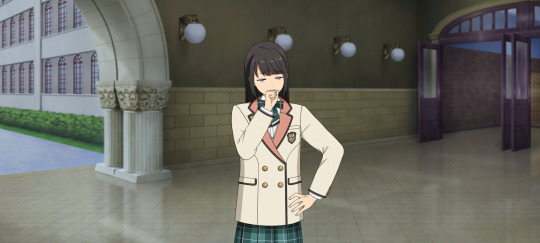
Hajime: …Gh… uhu… hic…
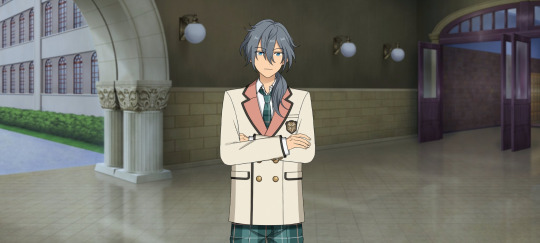
Miki: ………
-----
[ The next day ]
Hajime: ……… Hah.
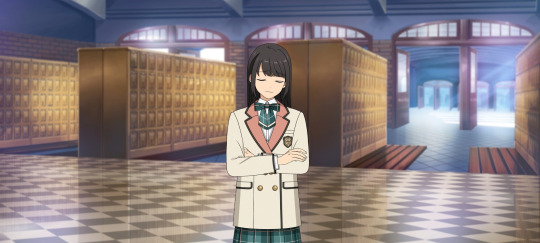
Hajime: (I didn’t get a wink of sleep at all... Ah, hang in there, me. We can’t stay like this. Life goes on. We need to get back to usual…)
Miki: Hey. Stop idling around. You’re in the way.
Hajime: Ah, s-sorry!
Hehe, you caught me daydreaming. Good morning, Kurose-kun.
Miki: ………
Hajime: Hm? What’s wrong? Is there something on my face?
Miki: …A weird face.
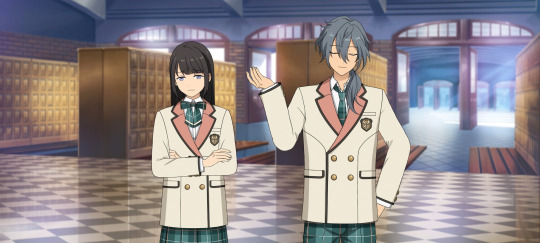
Hajime: Hah?! Excuse me, I didn’t order rudeness for breakfast! Well, I'm so sorry that I was born with this face!
Miki: …Come with me.
Hajime: Huh? Hold up! How about classes?!
Miki: Skipping.
Hajime: What?! W-Wait a minute! Stop pulling my hand!
-----
Hajime: Ahahaha~!
Miki: ��God, do you really have to laugh out so loud?
Hajime: Sorry, sorry~ I thought I was gonna get it this time, but of course a hole suddenly appears on the platform the character stepped on.
It’s the first time I saw you panic like that!
Ah, now that we're on the topic; I didn’t know you're such an expert in arcade games. You even got this huge plushie!
Is it really okay for me to have this?
Miki: I guess. It’s not as if I wanted a plushie myself. I only like getting it. If you want it then you can have it.
Hajime: Hm~? So I’m just a convenient recipient because I’m here and I want it? Well, I won't say no to that. I’d love to have it. Thank you.
Miki: ………
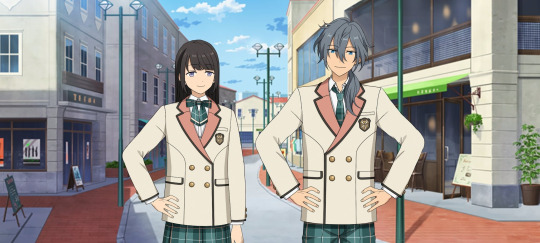
Hajime: Hm? What’s up? Something good happened?
Miki: Are you having fun?
Hajime: Huh? Oh, yes! I’m having a lot of fun!
Miki: Then continue smiling like that when you’re with me. Your face looked worse and grim this morning.
Hajime: ………
Mm. You really came in the perfect time... The truth is… I wasn’t up to go to class today, so you really helped me.
I feel a bit better now. Thanks for letting me hang out with you, Kurose-kun.
Miki: Is it because of what Eiki told you?
Hajime: Huh…?
Miki: I saw you and Eiki in front of the fountain yesterday. My bad, I didn’t mean to eavesdrop.
Hajime: ………
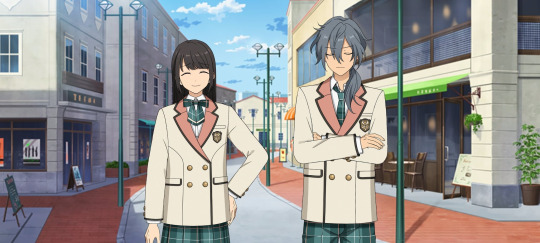
Hajime: Ahah~ you heard us?
Haha… That’s embarrassing~ Mhm. I think I did something that made him angry at me.
I mean, it’s already weird from the start. He’s the school’s lauded prince, isn’t he? It doesn’t make sense that he’s got anything to do with me…
So, I’m fine! Very, very fine. If I can just pretend to go back to the time when I haven’t met him at all—
(Oh no… Talking about it myself just brings tears to my eyes.)
Miki: ………
Hajime: …! Kurose-…kun? Let go—
Miki: Just choose me. I won’t ever make you feel this kind of loneliness. I’ll always put a smile on your face.
Hajime: Huh…?
Miki: Erase that guy in your mind. He’s the worst bastard who just pushes someone away without properly explaining why.
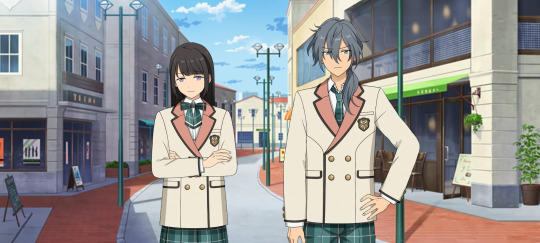
Hajime: Stop calling him that! Nakaouji-kun is not the worst bastard! He’s always been so kind to me! I was the happiest when I was with him!
Miki: …Then why not let him know? Did you even tell him that? Even if you wanted to say something, you just backed away with your tail between your legs, didn’t you?
That’s why you’re not your usual self.
And I’m sure that guy too is…
Never mind.
Hajime: Kurose-kun…
Miki: Go and tell him what you feel.
And if that doesn’t go well, I’ll…
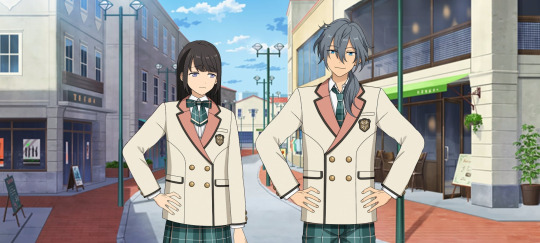
Miki: …I’ll take you to the arcade again. Just think of it as your save point. With that in mind, wouldn’t it be easier to give it your all?
Hajime: Yeah… Thank you.
-----
Previous Chapter // Next Chapter // Translation Masterlist
#enstars#enstars tl#ensemble stars#enstars translation#hajime shino#eichi tenshouin#niki shiina#koisuru scramble#koisuku
13 notes
·
View notes
Text
Sunspot Coffee and Tea
Against our promise to avoid writing for a bit while recovering from a minor burnout, I wrote something here tonight. It might have been therapeutic to do so, honestly.
It's a coffee shop AU self insert crossover fanfic of Wildow's Otherverse and the Sunspot Chronicles, titled "Sunspot Coffee and Tea". It takes place on this Earth, though. Descriptions of Others, Practicioners, Aware, and the Seal are from the work of Wildbow, A.K.A. John C. McCrae, and belong to him. We reference them here with love, and no intentions to make any profit from them, even if we stretch their intended canonical possibilities a bit. References to everything else not of this Earth, including Ktletaccete, beshakete, and `etekeyerrinwuf, are of the Sunspot Chronicles and belong to us, the Inmara. All the characters are headmates and therefore real people.
The Black Drop was a real coffee shop that was really like that, and we miss it. A lot.
We'll probably put this up on AO3 later. No warnings are necessary for this fic. It's 6093 words, light, hopefully cute, and totally self indulgent:
In Tanasbourne, Hillsboro, Oregon, in one of the strip malls there, there used to be an Insomnia Cafe next to a brewpub.
It’s still a cafe. Of a sorts. It was bought out a couple years ago, however, and has a new name. It’s called Sunspot Coffee and Tea.
There are some interesting things about this cafe, not the least of which is that they don’t accept money. How they manage to stay functioning without actually doing business is a total mystery to all of their neighbors and patrons, but if you want any sort of drink or pastry there, all you have to do is walk up to the counter and ask for it. Of course, the pastries have to be available, and it’s first come first serve for them. But they produce them quickly enough that if they’re out of something, you just have to wait thirty minutes or so. At most.
Before it became the Sunspot, it was like most cafes of its sort, especially in that neighborhood, attracting working class people who had at least some decent income. And that part of Tanasbourne wasn’t really known for being accessible to the less fortunate.
However, after it became known what their new mode of “business” was, people in need would take the MAX and the bus from all around to get a free meal, and they were quite welcome.
The clientele changed quite quickly, and this created something of a controversy in the neighborhood. Theories sprang up and circulated when efforts to bring the law down on them failed utterly. Stories about the mafia, or even more unbelievable things. One of the stories is true.
Eventually, things settled down, and everyone got used to the new culture and routines that the Sunspot brought to Tanasbourne.
I happen to know exactly how that all played out and why, but I’m not telling. I’ve taken oaths. I’ll give you hints in this story, though, because I think I can get away with it, and it’s kinda fun.
In any case, it was under these circumstances in that cafe that I got to watch a connection made that I had never expected to see. One that may well lead to the kind of quiet, sweet partnership that causes the world to glow just a little brighter at the ambient level, without most people quite knowing the source.
Of course, it started during a day when Eh, our boss and Senior Captain, was working the counter.
I was sitting at a table with Gesedege and Gnargrim, enjoying a round of Brekken’s tea while slowly discussing the intersections of public relations and security for the shop. Which is to say that we mostly sat, quiet, watching steam rise from our drinks, looking around at the guests and just soaking up the joy of seeing people rest who might not otherwise get to. And then, occasionally, one of us would take a sip or say a word or two, and the other two would nod or take sips as well.
And a new person walked in. Someone we’d never seen before. And I could tell by the way they entered the shop, they hadn’t yet heard about who and what we were. They hadn’t got the story yet. They probably thought this was a typical coffee shop.
They put on a double layer of masks before entering, which was good. Largely unnecessary in the Sunspot, but with covid still running rampant in the rest of the world, despite all the propaganda suggesting otherwise, their N95 disposable under a metallic hot pink mermaid print etsy number was a really wise idea. And it certainly put most of our guests at ease, even though they weren’t wearing masks anymore themselves.
But there were some smirks as this person reached into the pocket of their navy blue sleeveless cloak to pull out their card purse as they navigated through the tables and easy chairs to the counter. The long, black feather in their wide brimmed black wool hat bobbed as they went, boots squeaking on the wood floor.
Eh smiled as they looked up from a drink they were preparing for someone else.
And it was at that eye contact that the person realized they’d walked into something different.
They probably hadn’t noticed the lack of a cash register or POS yet. They’d obviously missed the appearance of me and my compatriots, since they’d been absorbed in arranging their garments and fishing out their method of payment, and had glanced at the other guests. They’d just happened to look the other way as they passed our corner, which was right near the door.
If they’d seen us, they might have had the same reaction they were having at the sight of Eh.
Eh is tall. They tend to keep their height low enough that they don’t have to crouch while in the building, but their antlers will just miss scratching the ceiling when they straighten up from a task like decorating a mocha. Their tail has a tendency to fill the walkway from the kitchen to the front counter, and their wings will block the view of the front from the rest of the staff who are in the back. And through clever programming, they’ve managed to turn the outer skin of their body into a satiny dark purple that seems to be full of stars and nebulae and is somehow constantly rim lit, regardless of the actual lighting of their surroundings.
Most human beings, upon seeing that vision, will later describe it as having been like walking right into VRChat. Only, I’ve logged into VRChat, and nobody has yet been able to create an avatar of that detail and refinement.
“How may I help you?” Eh asked.
The newcomer looked around, clearly startled and worried, and caught the vision of Gnargrim, Gesedege, and myself holding our tea cups up in greeting.
If you look at my tumblr icon, you’ll know what I look like. I’m slightly smaller than Eh, and like to sit in my easy chair backward, resting arms and chin on the back.
Gnargrim, built like a cross between Eh and myself, also uses chairs in a similar way.
Gesedege, however, has taken to dressing like a human, and will stow their tail away in order to sit in a chair. But their muzzle, parabolic ears, and pair of horns tend to give away their origins as easily as Eh’s countenance.
Most new people at this point tend to freeze and gape, and it takes a certain amount of talking and coaching from the other guests to get them to relax and start to feel at home.
This person, however, scowled, brows knitting together above their mask, eyes squinting. They reached into their cloak to where a metal handled antique cane was hooked into an inside pocket and pulled it out with their right hand, clapping its point to the floor.
Gnargrim raised an eyebrow my direction.
We hadn’t seen this reaction before at all.
They whirled to speak to Eh, and asked, “Are we in the presence of Aware?” They lightly gestured at the other guests.
Eh opened their mouth for a moment, tongue and teeth glowing, pausing to think, before speaking, “Everyone here is aware of who we are, yes.”
The newcomer relaxed and bowed their head, then looked up and spoke more softly, “I’m sorry. My name is Anne. She/her. I’ve just moved down here from Washington, and didn’t realize a place like this was here. The Lord of Portland made no mention of the Sunspot, of course, but nobody else did either. I would have thought it would be recommended or warned about. Am I welcome here?”
Eh tilted their head, “Lord of Portland?”
Anne took a step back, and said, “Asterix. Right?”
Eh shook their head lightly, “I have never heard of them.”
“Him. How?” Anne corrected, then asked, tense. Then she shook herself out and stammered, “Sorry! Sorry. Please pardon my rudeness and short language. This feels like a very unusual situation and I’m finding it hard to mask.”
“You are wearing one,” Eh pointed out.
Anne looked around, then back at Eh and said, “I’m the only one here wearing one. Do you have a ward of protection up against pathogens?”
“You… could put it that way,” Eh said. “The air is heavily filtered and everyone here is personally protected with our technology. It should be safe for you to remove your mask here. If you wish to have your own personal protection, you’ll have to give us your consent to give it to you. It comes with side effects, however. You are also very welcome here. I am assured that this is considered a safe place to be, even though I have never heard of Asterix or a Lord of Portland.”
Anne hesitated midway through taking her hat off to remove her masks, then decided to proceed. Her long brown hair had a freshly trimmed sidecut, and her face was covered with a fine layer of stubble. Like many people in the Pacific Northwest, she didn’t wear any makeup, but she had earrings and an eyebrow piercing. Her glasses had little dragons sculpted into the sides of the rims.
She smiled hopefully as she put her masks into her pockets, cane hooked into the crook of her arm as she worked.
“Can I order a coffee?” Anne asked.
“You may have one,” Eh said. “I’d be more than happy to make it for you.”
Anne paused again, blinking, then asked, “How much is it?”
Eh smiled, “It is free to anyone who asks.”
“Even a twelve ounce decaf mocha?” Anne asked, gesturing at the drink that Eh had just finished up.
Eh nodded and said, “Yes. Even that.” Then they looked across the cafe and called the name, “Maxwell?”
A man in an orange knit skull cap and a blue puffy jacket got up from his seat and wandered over to get his drink, thanking Eh and nodding to Anne before sitting down again. Anne’s eye followed the checkered handkerchief that hung from Maxwell’s left back pocket. She didn’t seem to have any strong emotional reaction. It seemed like a reflexive look followed but a decision to be satisfied with it.
Then she looked at the line of big pride flags along the wall, and smiled back at Maxwell, nodding.
“OK. Please let me know if anything is expected from me. I’d like to be a good guest,” Anne said. “I would very much like to have a decaff twelve ounce mocha, with no whip cream. And, do you have pastries?”
Eh nodded, then gestured to the case to Anne’s left, which held all the available pastries.
Anne bent to look, leaning on her cane.
“Are those cheese danishes?” she asked.
“They are!” Eh replied.
“I’d like one of those.”
“Certainly!” As Eh began to work on Anne’s mocha, they reached over with a foot and slid the back door of the case open. And then they did one of our little tricks, turning their extended hind limb into a tendril with a hand on the end of it and used it to select one of the danishes and pull it out of the case to put on a plate.
Anne watched this with an intense curiosity, completely unalarmed.
It was obvious that the other guests who were still watching were impressed with her reactions, but they also largely started to turn their attention away. To them, she might as well have been a regular at that point.
Not to us, though. She was behaving somewhat strangely. She was speaking of things that were established to her, such as the Lord of Portland, that we knew nothing about. I could see in Eh’s eyes that they were avidly intent on learning more. And I made a note to ask Morde to look into it if Eh did not.
It looked like Anne was about to ask another question when Eh beat her to the punch, “So, what brings you to Tannasbourne?”
“Ah, my girlfriend,” Anne said. “I’ve moved in with her.”
“Oh! Wonderful!” Eh said.
“Of course, what with Practice and the Seal, now I’ve got business here, too,” Anne said, a little less brightly, in a humorously onerous tone as if Eh should know what that meant.
Eh nodded absently but didn’t say anything, letting Anne think what she might think for the moment.
“How long have you been here?” Anne asked. There wasn’t anyone behind her, so she felt like she could stand and chat.
Which suited Eh just fine. Eh replied, “We arrived about eight years ago, and set up shop two years ago, after the pandemic hit the cafe that was here particularly hard.”
“And, if you don’t mind me asking again, you don’t know the Lord of Portland?” Anne asked. “How is that?”
“Well,” Eh said amiably. “We didn’t know that there was one, to begin with, if you’re really not talking about the Mayor.”
“I’m really not,” Anne said. “That’s kind of amazing.”
“Is he kind of like Emperor Norton?” Eh asked, referring to Joshua Abraham Norton of San Francisco, who had declared himself Emperor of the United States in 1859. We knew about him from one of our regulars.
Anne turned her head sideways slowly and drawled out, “nooooo? Not really. Though, I think Emperor Norton might have been a Practitioner.” She said that with an emphasis that gave me visions of both italics and a capital letter. “Asterix is an Animus,” she explained. “A surprisingly strong one, too, for his origins.”
“An Animus?” Eh asked, clearly dawdling on Anne’s drink to maintain the excuse to do something while talking.
Anne didn’t seem to mind, but she did sway side to side on her feet a bit, still leaning on her cane. I had to admit, even though her back was turned to me I was still watching her expressions via our surveillance channel. Really Gnargrim’s job, but I was very curious about her. As were we all. She looked like she was trying to concentrate. Not frustrated, but maybe confused.
I’ve been studying human expression pretty avidly, so I’m fairly confident about that. But I could have been wrong.
“An Animus,” Anne confirmed. “You know. An Other that is a manifestation of an idea or common emotion?”
“Oh!” Eh exclaimed, stirring chocolate into the shot before pouring the foamed milk into the cup. “We do know one of those, but it didn’t follow us here. It was afraid there might be others like it, and it didn’t want to encroach.”
“OK, so you do know what a Lord is?”
“No,” Eh said. “We really don’t.”
“But, you’re Other and you know what an Animus is, and you’re here.”
Eh held up a claw with one hand, and the milk pitcher in the other, “I am friends with a thing that can be described by your definition of Animus, yes. But that’s not our word for it, though. And I’m not sure what you mean by ‘Other’. That sounded like it had a weight to it and a context that I don’t know about.”
“But you’re not human,” Anne said.
Eh shook their head, then began to pour the milk into Anne’s cup.
“So you must be Other,” she concluded.
“So,” Eh carefully waved the pitcher to create a rosette on the top of mocha. “Other, in this context, means not human? Such as an alien, yes? I’m assuming you wouldn’t call a cat or a bird an Other.” Eh was managing to verbally put that capital letter on that word, just like Anne had been doing.
“No?” Anne said cautiously, putting a question to it in uncertainty. Then she asked more firmly, “What do you mean by ‘alien’?”
Eh glanced at Maxwell with a bit of a smirk, and said, “You know, like in 3rd Rock from the Sun.” We’d all watched that show on recommendation from our eldest regular.
Anne straightened up and did the backward step again, blinking.
Eh offered her her drink.
She squinted at them long and hard, then turned to my trio and did the same to us. I noticed that her pupils glowed a bright pink. Which is not something I’ve seen outside of our own Network before.
“You’re not Other,” she muttered.
“We’re not?” Eh asked.
“You don’t look like Others through my sight,” she replied.
“Interesting.”
“So, you’re aliens? Is that what you meant by ‘arrive’?” she asked.
“Ktletaccete,” Eh said. “Our word for aliens is ‘beshakete’, or Outsiders. And to you, we are Outsiders, yes. But we call ourselves Ktletaccete. It’s fascinating that you don’t detect us as Other, though. What does that mean, exactly?”
“You all have strong Selves like humans typically do. The spirits react to you as if you do, and you might be able to Practice, if you’re not doing it already,” Anne said. “You absolutely don’t resemble any of the Others I know about. My sight is particularly attuned to that kind of thing.”
Several of the guests were paying attention again.
“I think I need to sit down,” Anne said. “But, can we keep talking?”
Eh nodded, saying “Certainly.” And then commanded a chair to form from one of the bins, graphene colored clay crawling out of what people often took for a trash receptacle and slithering across the floor to shape itself into a seat particularly suited to Anne’s height and shape. Eh gestured at it.
Anne watched this and then pointed at the chair, stating, “That’s not Practice.”
“Ninite clay,” Eh said. “It’s part of how we got here.”
Anne experimentally sat down in the chair, and then looked surprised at how comfortable it was. It molded itself to her body and adjusted itself to her needs as best it could without the neural link.
Watching, Eh said, “The nanites are also how we provide protection against pathogens for those who consent.”
“Can they replicate?” she asked, with a tone of nervousness in her voice, moving as if considering standing up again.
“Yes,” Eh said. “But not without explicit command.”
“I thought that wasn’t possible!” Anne exclaimed. “I remember reading on Wikipedia…”
“The prevailing theory is that our Animus helped us make them,” Eh said. “If it is an Animus.”
“Oh.”
“Can you tell me what you mean by ‘Practice’?”
Anne took a sip of her mocha and raised her eyebrows in appreciation, “Magic. Through vows to keep true to one's word and uphold the old pacts, humanity can command the spirits to do work. Move energies. Alter reality a bit. Summon Others. Travel places. That sort of thing. Magic.” Then she looked startled with herself, and looked back fearfully at the other guests.
Maxwell grinned and waved back at her.
“Wait,” she hissed, turning back to Eh. “If you’re aliens and you don’t know about Others and the Practice and all that, then, what about everyone else here? Are they all aliens too? In disguise? Please tell me they are.”
“No, sorry. We cater to humans,” Eh said.
“Oh, shit,” Anne said, looking up at the corners of the room.
“What’s wrong?”
“I think I just said a whole lot of too much,” she shrank into her seat with dread.
Eh settled onto their haunches and leaned on the counter with their elbows, lowering their head with deference and concern, “That sounds bad. What are the consequences? Can we help somehow?”
Anne glanced at the other guests again, most of whom were now watching with various looks of surprise, concern, and enlightenment. Some of them were clearly putting two and two together for the first time regarding things we still had no clue about. Others seemed to be familiar with what Anne was saying, and maybe displaying concern for her. And the rest might have been hearing about this all for the first time.
Anne slumped and looked down at the floor, “I’m gonna take a big hit. I don’t know that there is anything you can do. I’m responsible for what everyone knows now.”
“Don’t sweat it, Anne,” Maxwell called from his seat. “We all know they’re aliens, right?” He looked around at the rest of the room, and was met with nods. “I don’t think anything you’ve said has really changed any lives here. Except maybe theirs, you know?” He gestured at Eh and the rest of us. “But, I bet you the Kletachitay don’t fall under the protection of the Seal, right?” He pronounced our people’s name with a distinctly West Coast accent. Most people around here did.
She rose slightly out of her seat to turn and look at him.
He nodded solemnly, with an inclination of encouragement, gesturing with his drink. Then, when he was sure she took that sentiment, he turned to relax back down into his own chair.
“It’s probably true,” someone else said.
Anne visibly relaxed and grinned nervously at Eh.
“Tell you what,” Eh said. “If you want to keep having this conversation in private, we can arrange that. If it would be better for you. We have our own secrets. We understand. But I would also like to learn more about this Lord of Portland, and maybe I should meet him at some point?”
Anne nodded.
Eh smiled, “There are a couple of ways we could do this. We do have a back office, which we could use, if you like. Or – well – we don’t really have hours, but it’s usually super quiet around 4 am. Sometimes we don’t have guests here at that time. But that’s not guaranteed. Or, you could consent to a neural terminal, and we could meet over the Network, if that’s not likely to mess with your, uh… You do Practice, right? Would your spirits reject the nanites?”
Anne’s eyes went wide as she took in a breath and held it, looking up at a corner of the room in thought. She looked fearfully back at Eh and said, “I don’t know. I’m kind of afraid to try. Um. Yes, I Practice. Yes. Um.” She glanced around the room again. “Through a bit of a loophole I can tell you about later.”
“A loophole?”
“Later.”
“OK.”
While they were having this part of the discussion, I witnessed yet another thing that was unprecedented to us.
Maxwell gave several of his fellow guests meaningful looks and exchanged nods. Then, some of them got up and spoke very quietly to other guests. And as Anne and Eh negotiated how they might talk in private, the presumably human guests of the Sunspot cafe began to gather their things and file out of the shop. Some of them waved to Eh or to me, Gnargrim, and Gesedege.
Eh looked just as surprised and bewildered as I did, and Anne noticed, so she looked back at the rest of the cafe to see what was happening.
“Don’t worry, Anne,” Maxwell said. “We’ve got your back. We’ll keep as much Innocence as we have left for you. Might come in handy, right?”
Anne looked utterly flabberghasted.
“After all,” he explained. “You’re family.” Then he gestured at the trans pride flag with his paper cup, and smirked.
He tugged the fold of his hat as he passed me, uttering my honorific, “m’Drah.”
Maxwell’s one of my favorites, but he surprised the hell out of me that day.
Anne stared at the flag for a few seconds then looked at the door closing behind Maxwell’s back, eyes brimming with tears.
“I never thought I’d find a replacement for the Black Drop,” Anne said in the now emptied shop. “I thought that was an era that was gone forever.” She heaved out a couple of silent laughs, shaking her head. “But this place. How do you – ?” She trailed off, apparently unable to complete the question.
Eh brought themself back from their own bewilderment and replied, “We have some secrets we’re not going to divulge to even you. At least, not until our Council can agree to it. It looks like we could convene one right now, though.”
“Let’s go a bit more slowly than that,” Anne said, shakily.
“Sure.”
“Um,” Anne said. “I’m not exactly human, myself. I mean, I’m human enough now that I can Practice. Gaining a human enough Self was… a neat trick. I’m not sure I can explain it without giving you a whole education on the different kinds of Others and how Practice under the Seal works, though. Let’s just say that I’m old enough and experienced enough that I’m absolutely mortified that I was that careless. Bewildered, in fact.”
“Was the Black Drop -” Eh started to ask.
“A coffee shop where I came from,” Anne replied. “They weren’t like this. I knew only a few Others and Practitioners from there, but you couldn’t talk about that stuff in their lobby. You could talk about everything else, though. You could talk openly and loudly about your weirdest special interests, about being plural, or what it meant to you to be queer, and no one would bat an eye. And they called me family the first day I walked in the door, too. We had to chase the occasional bigot out a few times, but it was home in a way that no home ever was, you know?”
“I’ve heard Maxwell say something like that about the Sunspot,” Eh said. “But I don’t really know? I can’t. I can approximate from my own experiences, but I’m not human or Other, as you describe it. I didn’t grow up in this world.”
“Yeah, that makes sense,” Anne said, finally trying her danish. She gestured with it, “This is phenomenal!”
“Thank you.”
“You really should meet with the Lord of Portland, though,” Anne said. “I think I can arrange that. I’m really surprised he hasn’t reached out to you. Maybe he doesn’t know you’re here for some reason? But he should. By virtue of his station, a place like this should be known to him. Your presence should be felt.”
“Could it be possible that someone we’ve done business with covered that without telling us how it all works?” Eh asked. “Kind of like how we operate here legally?”
“Maybe,” Anne said. “Also, you’re not Others and you’re not Practitioners, so you technically don’t fall under his rule. It’s just that you don’t really belong here, either. How did you get here?”
“Oh, that’s a long story,” Eh said. “But I think I can summarize it intelligibly.”
“I’ll try to understand it,“ Anne said.
They were both so much more relaxed now, and my Crew mates and I fell still to let them continue talking as if we weren’t even there. Eh never gave any indication we should leave, though, so we did stay and watch. I don’t think I’ve ever seen Eh so at ease with anyone before, honestly. I’ve known them through… so many lifetimes. I wondered what was different about Anne. Something was obviously clicking between them now. The speed with which they responded to each other picked up.
“One of our people, with help from `efeje`e, our Animus or whatever it is, figured out how to warp space/time and transport a vessel over hundreds of thousands of lightyears without aging significantly inside it,” Eh said, as if this was nothing more than discovering and developing a new Art. “We let her leave the original Sunspot on her own journey, with a Tunnel aboard so we could keep communication. And she’s been jumping around from star to star, exploring the galaxy since. And she’s been collecting a bit of a crew for herself in the process. But, um… That’s several novels worth of story. Anyway, she’s gotten pretty good at sneaking onto and off of inhabited planets without being noticed.”
Anne dropped her jaw and squinted, shaking her head, and said, “This sounds just like any science fiction story.”
“It feels like one, yeah,” Eh agreed. “The idea that we can bend space/time like that is phenomenal. After hundreds of millennia of evolution and development, you’d have thought we’d have discovered it sooner, if it was that possible. But, it did take help from `efeje`e, you know. And our agreement with it was also unprecedented.”
“So, maybe your warp drive was a kind of Practice?” Anne asked.
Eh shrugged, “Maybe.”
“But, wait,” Anne tore her danish in half and gestured with part of it. The chair had a cup holder when she needed it. “How did you get here, if you didn’t go with your explorer?”
“The Tunnel,” Eh said. “We can send consciousnesses through it. Everyone here is what we call Crew. We ascended long ago, our original bodies dying, and now live in the Network created by our nanites. When Molly told us about this planet, a few of us decided to transfer over and stay here. She dropped off a bin of nanites and we started making a new home here, as quietly as we could. But it became apparent humanity could use a little help, and our local Council decided to start being a bit more overt.” Eh gestured at the cafe in demonstration.
“And you’re doing this,” Anne gestured at the cafe herself, “without the help of Practice? I don’t even see Glamour at work.”
“As far as I know, yes,” Eh said. “Though, it seems Maxwell is aware of Practice, at least.”
“You’ve definitely cultivated a clientele full of Aware,” Anne remarked. “Which I supposed shouldn’t be at all surprising. You’re a bunch of extraterrestrials giving away food for free. Of course you’re going to attract the Aware. They need people like you. And they have a tendency to take weirdness like this in a certain kind of stride, because weirdness is part of what made them Aware. And if you haven’t even been visited by witch hunters, then someone’s gotta be covering for you.”
“Kinda figures, I guess,” Eh said.
Anne looked at Eh for a while, danish in one hand, drink in the other, then asked, “You look a lot like someone’s idea of a dragon.”
“I’ve been told that, yes,” Eh said. “We think this is what Ktletaccete looked like before we took to the stars and started tinkering with our genetics and life itself. Our oldest language hints at a shape like this, and it’s what felt right to me when I decided to stop being how I was born.”
“That sounds a little like something I’m familiar with,” Anne said, before taking a bite of the last of her danish.
Eh inclined their head, twitching it in the direction of that particular flag, “we’re family?”
Anne swallowed and looked at the flag, “You have trans people in your culture, too? Assigned gender?”
“Ah,” I couldn’t help myself from vocalizing, and Anne glanced at me. I grinned back, and nodded at Eh.
“Not the Sunspot. Or, the `etekeyerrinwuf,” Eh said. “We made sure our new world, our own Exodus Ship, didn’t have assigned gender. But Fenmere, Gesedege, Gnargrim, and I were all born on a ship that did. Or something close enough to it that it’s basically the same thing. We didn’t have the word ‘trans’, obviously. But, again, close enough. We weren’t able to end dysphoria by ending gender, though. Even with technological interventions before birth, eugenics even, as abhorrent as it is, we can’t stop some people from being born with the need for physical change. Sometimes it develops later in life, too. It’s better to accommodate it when it becomes known. Anyway, I digress. We have an understanding with your transgender people. We get it. It’s ultimately why we’re here.”
Anne, apparently, was stuck on the first few words of Eh’s explanation, “Can - can I ask? How old are you?”
Eh smirked, but I wondered if Anne would read it as a smirk. Anne was too focused on the subject of her question to be bewildered by Ktletaccete expressions like a lot of other Earthly people often are, though.
“Do you want to know my age by my own personal years experienced? Or from your perspective, taking into account relativity?” Eh asked back.
Anne grimaced, “Let’s go with years you’ve experienced.”
Eh titled their head and looked at the ceiling as if to calculate. I knew this was a hard thing to answer for a Ktletaccete of our age. I don’t like thinking about my own age, myself. It kind of defies memory. Causes a kind of dysphoria itself. I could see Eh’s face twitch as they settled on an answer.
“I’m going to give you an estimate,” Eh said. “Calculated in your years, but for my experience. And really rounded off. At a certain point, the thousands digit means as much as the ones digit.”
Anne looked what I’ve come to discern as incredulous.
“Two hundred and some millennia,” Eh said. “Maybe thirty? Maybe fifty? It gets squidgy.”
Anne blinked and deflected internalizing that with an observation, “You use English vernacular like you were born here.”
“We’ve been here eight years, and we live in trillions of tiny machines that can house the consciousnesses of millions of us,” Eh said. “Our ability to translate and learn your language is… enhanced.”
“Two hundred thousand years?” Anne asked, back on the topic.
“Yes,” Eh said. “More or less. Mostly more.”
“Well,” she said. “At least you’re not embarrassingly older than me. Just a smidge, though. A bit of a smidge. Like a civilization or two. Well, technically, it’s off the other end, and there weren’t civilizations back then, so…”
Eh drew their head back and raised their lure in surprise, asking, “How does that work? If you’ll excuse me for asking. How does a human live that long? I thought your civilizations were less than a few thousand years old at this point. You only had your industrial revolution two hundred years ago or so. Your computer technology is less than a century old.”
Anne grinned, licked the icing off her fingers one at a time, and then rubbed her hand dry on her cloak as she stood up. She held out her hand as if to offer a handshake to Eh, and said, “Former Primordial Goddess of Hospitality and present trans girl, Anne Other Problem, at your service. Welcome to Earth, I guess!”
Eh straightened up and sloughed off a considerable amount of nanite clay, reconfiguring their body to be about the same size of a human, but otherwise the same shape as before. The excess clay oozed toward the large bin in the back, reverting to its graphene color almost immediately. Then they stepped around the counter to stand before Anne and took her hand to shake it.
“My name is Eh.Though, that’s really a title. My name is Yenfiri. My pronouns are they/them. Former Senior Captain and Founding Crew of the `etekeyerrinwuf, revolutionary, trans enby as you’d say, and co-Artisan of Sunspot Tea and Coffee,” Eh said. “And it is a real pleasure to meet you. Thank you.”
“I don’t have anywhere near the power I used to have,” Anne said. “But I’ll do my best to step back into my old role for you. Your customers… Or, I guess they’re your guests? Their actions speak very well for you and what you’ve done for them. We need places like this. But let’s try not to make too many waves. I think you’re in a more fragile position than you realize.”
“You’re our hostess,” Eh said, glancing at me.
I nodded. The Council would accept this. We had a habit of still treating Eh like Captain, anyway.
Eh concluded, “We’ll follow your lead.”
“Asterix might want you to pretend to be human from now on,” Anne said. “It might be for the best if you did, honestly. But that might also depend on what kind of protections you don’t know you have.”
Eh grimaced, “If it comes to that, we can comply. But it will hurt. Some of us will have to front more than others. Whatever it takes to do what’s safe, though.”
Anne nodded, “Let’s go see the Lord and find out what he has to say.”
“Sounds good.”
And nodding and waving to us, they walked out the door, just like that. Though, before they took their third step beyond the threshold, Eh had changed shape to their human disguise, which looked remarkably like Yenfiri had before their body had died. Just a different species, obviously.
4 notes
·
View notes
Photo
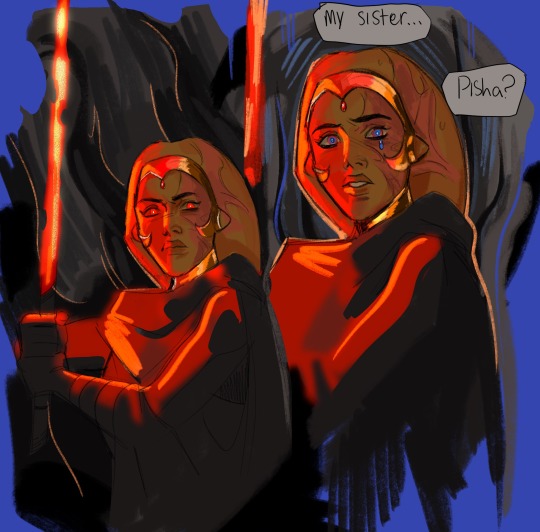
new bounty acquired-- your brainwashed jedi knight younger sister 😳
#senna#senna reyhe#swtor#jedi knight#jedi#i just like when class characters are related and their stories intersect :)))#pisha#pisha reyhe
364 notes
·
View notes
Text
Keep Talking
Larissa Weems x Student!Reader
Authors Note: Hey everybody! I recently wrote a story where reader has a stutter and someone was lovely enough to chat with after I posted it about the misconceptions that I wrote into my fic! I do want to apologize to those with a stutter or related speech disorder for displaying stereotypes or making you feel underrepresented! I try to do adequate research before writing about any intersections that I do not have and I failed to do so with the other fic.
I hope I did better with this one! I used the resources below to write it!
Here are a couple resources for other writers who may chose to write characters with a stutter: Writing Characters Who Stutter or How to Write Stuttering (from a writer who's father stutters)
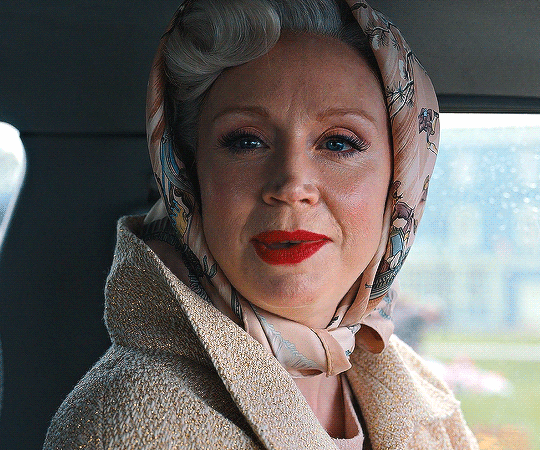
(Reader struggles with b, p, k, and w sounds.)
You were waiting at the Weathervane for your friends when Principal Weems graced the premises. Her head was held high as she pushed past the front door towards the small line of people waiting to order. You went back to typing on your computer, trying to complete an essay for anatomy class.
When she ordered, she sat across from you while she waited for her name to be called, "Now how are you today. Mx L/n?"
You had never had much of an opportunity to interact with Principal Weems while you were attending Nevermore, but from the few interactions you had, she always seemed nice enough.
"I'm good, P-p- I'm good. How are you?" You stopped yourself and restarted the thought, deciding to avoid saying her name all together.
"Very well. I'm just stopping in to get a coffee before my afternoon meetings." She gave you a theatrical eye roll, but it her tone suggested that she truly wasn't dreading any of her meetings. From what you understood, she seemed to like her job, apart from the occasional misbehaving student, "What are you doing here? Waiting for friends?"
"Yes, they were-were supposed to meet me here around 11, b-but they are running late." You explain, glancing down at your computer to check the time. It was only 11:15 and they had texted you that they would be there soon.
"I can keep you company until then if you would like?" Principal Weems offered. Just then her name was called and she gave you an apologetic glance as she lifted herself from the booth to retrieve her drink. She came back to sit with you, her hands on either side of the cup to soak in the warmth, "What are we working on?"
"W-well I started a p...paper on gorgon anatomy and I'm really enjoying it. It is very c-" You stop yourself and plan out the next few words wisely, "It is very interesting to learn about their abilities to stone p-people."
"Keep talking." Principal Weems was always one to make sure she encouraged students to find subjects they loved. In the end, she ended up helping you tons with your project that was due. It turns out that Principal Weems seemed to be well versed in many outcast subjects. You grew more and more comfortable talking with her, your stutter became slightly more subdued, but not absent.
When your friends arrived, Principal Weems was quick to stand, greeting the other students as she did so. She took her coffee from the table and big you a individual goodbye, "Great talking with you, dear. Have a wonderful day."
"You too!" You call after her before turning back to your friends to hear their story of why they were so late to coffee.
#larissa weems x reader#larissa weems#student!reader#plantonic#wednesday netflix#principal weems#principal larissa weems#gwendoline christie#fanfic#oneshot
203 notes
·
View notes
Text
Related: More generally, this time more about the main conflict between Villains and Heroes, and how quirks play into it,
my other thumbs-up for Horikoshi’s worldbuilding is in the way he recognizes there’s not just quirks - there’s things like disability, background, education, socioeconomic class, rural vs urban attitudes, etc. All of which affects how someone’s quirk is perceived and what they go through in life.
We’ve got characters with deadly quirks that are successfully integrated into the world, a functional member of society; and characters with similarly deadly quirks who wallow in the criminal underworld; and we’ve got characters with powerful, strong, flashy quirks that easily become a Hero, and we’ve got characters with even better quirks than that ending up being a Villain bank robber. From what we’ve seen, a lot of the reason for differing trajectories in life is where these characters originate, which range from being born into a fabulously wealthy family, to being an dirt poor homeless orphan.
My favorite example of this disparity is the movie Villain Nine. Nine has a quirk that allows him to control the weather. As another character comments on it, it’s a god-like power, recalling the many deities in human tales who can bring rain or sun, storms or snow. It’s definitely a super strong, flashy quirk. There’s so many applications for it. Bring the guy to a drought-ridden land and he’s a Hero. in the old days, they would’ve made him king, probably.
Yet Nine, as an adult, wanders the streets in tattered clothing, implied to be left behind from the rest of society. He says his life has been filled with circumstances that have suppressed him, and it started when he was born apparently in a public toilet. His backstory is not expanded on, but one can imagine the story of his parents is not a happy, unfortunate, healthy one, and things did not get better. It’s why he resent the current state of society, why he desired a world of a pure hierarchy where strong rule and get what they deserve.
There are claims, both in series(?) and in fanon, that the world of HeroAca is already like this, one where people with strong quirks succeed, while people with weak quirks don’t (and if you’re quirkless, forget it). Nine contradicts this completely, and not just him: there’s Jin with his incredible Double, Mr. Compress with his amazingly useful marble quirk, and hell, Overhaul has his break-and-repair quirk, complete with his medical knowledge to use it. All of them lived on the margins of society, ending up either dead or rotting in jail.
Similarly - and this is where the elements of the Mutant Metaphor pops up again - there are bias against people with ‘dangerous’ quirks, but it’s not a straightforward ‘everyone with a ‘evil’ quirk is discriminated against.’ While you have Shinsou who always gets his ability called Villainous, Toga with her quirk that requires blood drinking to work its effect - and who could forget Shigaraki Tomura, whose very touch destroys - there are characters with quirks that, while doesn’t immediately gets pinged as creepy, can very much be lethal depending on how they use it. Bakugou makes explosions with his hands, while even Uraraka can kill someone via dropping them from a great height.
in regards to these similarities, it can be said that this there is no inequality, that Villains are created by their own choices; or that the issues with Hero Society that Horikoshi tries to convey fails, inconsistent on what society accepts and who society tolerates.
But I argue this is exactly why it works, because much like how it is in real life, there are numerous factors to how marginalization and suppression works. My Hero Academia understands the layers of power in the world, understands the intersections of fortunes or injustices, both the contradictions and the sources that feed upon each other, weaving a complex web that ultimately reveals giant gaping holes in the structure of Hero Society. Poverty is one of them; the failures of social services like foster care or quirk counseling is another, as are the class and family you come from. There’s a reason why Iida can get away with vigilantism and attempted murder; Jin has one traffic accident that wasn’t even his fault and he got a record for it.
In the end, all this gets blamed on the individual for being a Villain who just didn’t work hard enough, who didn’t pull themself up by the bootstrap. That’s the key to it: issues are systemic, bleeding into various categories, but so well faded into the background, so easily disguised as individual flaws that the suffering can be denied and ignored.
134 notes
·
View notes
Text
why 'there's no lore going on' right now in the dream smp - The Misfits Analogy
Fans of television, especially British television, will probably be familiar with an early 2010's show called Misfits. The show ran for five seasons spanning 2009 to 2013 - while the first two seasons (the first moreso than the second) are regarded more as cult classics, the latter half of the show completely falls in writing and production quality due to one significant change - the cast.
Seasons one and two of Misfits was centred around the original misfits gang - Nathan Young (portrayed by Robert Sheehan), Kelly Bailey (portrayed by Lauren Socha), Simon Bellamy (portrayed by Iwan Rheon), Alisha Daniels (portrayed by Antonia Thomas) and Curtis Donovan (portrayed by Nathan Stewart-Jarrett).
The show was good for two different factors from my perspective -
The intersection of superpowered television and interpersonal conflicts that broke the norm for stereotypes.
How the cast reflected modern British society.
In summary, the show followed a group of five young offenders at a community service centre. Not too interesting - but give them relatability, realism and explore their character development and their existing stereotypes/tropes through the use of superpowers? Genius.
Nathan was most definitely the fan favourite character of the show - he was outgoing, annoying, larger than life in a lot of ways and in all senses, he was a skeevy asshole who would insult characters at every turn. He was very much the class clown of the show and any British viewer could probably see someone they remember from school in Nathan, except Nathan was lovable and you could sympathise with him because you could see him struggling primarily at home and with his family.
Spoilers for the show - Nathan's power was immortality and the ability to resurrect himself from death. This power wasn't explicit immediately either to Nathan or to the audience unlike all of the other young offenders, and it reflected his 'nothing can hurt me ' attitude. Nathan was a character who could take any comment and brush it off like it was nothing, and he in the physical sense could take being thrown off a roof, impaled and practically buried alive and be sitting in his own coffin with his iPod all fine and dandy.
Kelly was also another standout example - her character reflected the stereotype of a chavvy girl, 'council house and violent' - loudmouthed, not very smart, questionable fashion choices and a bit abrasive. The only difference is that the show knew they had to subvert that stereotype - instead, Kelly was smart in her own way and she was empathic -> her superpower was the ability to hear other people's thoughts, and later, she became superintelligent and when her character left the show she decided to move to Uganda use her newfound rocket-scientist level intelligence for good. She was still loudmouthed and definitely chavvy, but she was also a whole human person who cared about other people and who was definitely intelligent.
If I kept going, I'd be lamenting about how season one's cast well reflected and subverted stereotypes and expectations using their superpowers, but I'd be here all day and that's really not the point I'm trying to make.
By the end of season 2, Robert Sheehan, as the standout performance from the show, decides to move on to greener pastures (which,, I don't blame him, being stuck on E4 would have been a nightmare for his career and look where he is now? He's a fan favourite as Klaus in TUA now!) - thus, Nathan is written out of the show in a post- season 2 special in which he gets locked up in prison in America.
This was the first character to get written out of the show.
In season 3, we lose Kelly who moves to Uganda with Seth to defuse landmines, and Simon and Alisha are both killed, and the only remaining member of the original ASBO five is Curtis.
Season 4 rolls around, and we pretty much have an entirely new Misfits cast - Curtis, and then we have Rudy (who had been present since season 3), and then we have new additions Jess, Finn and Abbey.
Let me tell you that by this point in the show, all of the fans had lost interest.
Not only had the two biggest fan favourites, Nathan and Kelly, left the show, but you now have to replace four out of the five original cast members with new ones that don't function the same way the originals did. What type of person is someone with X-ray vision trying to represent? You could argue that maybe Jess is good at figuring people out, but I don't really remember this being explored that much in the show. And the difference between this reflecting a minor personality trait is that the original cast didn't do that - in dumbed down terms, Alisha was a 'sket' who had the power to make people horny for her, oftentimes against her wishes, through skin-to-skin contact. That's much more impactful and there's a lot more to explore there.
Episode 7 of Season 4 of Misfits is the clearest indicator of the departure of the original show's intentions and explains perfectly why it didn't work the way it used to.
For the entirety of the season, Jess had been crushing on a guy called Alex from a bar she frequented (who later went on to replace Curtis as the fifth Misfits member in season 5, go figures) who, as far as we had seen, not at all reciprocated those feelings nor was there any indication of him wanting to.
In episode 7, we figure out why.
Jess, using her x-ray vision, finds out that Alex's penis was stolen by a trans man.
I'll be honest, when I first heard it, I thought it was a joke.
The show went from having a diverse cast, not only in terms of having two black characters in it's main cast, but also in it's diversity of character tropes that they aimed to subvert - to then having a mainly white cast in a show that actively perpetuates harmful stereotypes about trans people being dangerous.
Now, and I want to preface this, I don't think that the Dream SMP is malicious in the same way that the writing of that episode of Misfits is. I don't think the SMP is malicious at all. What I want to highlight is how the change in cast directly mirrored when the audience dropoff was and when the show itself started to go south in terms of quality, production and what they wanted to achieve.
For the sake of my argument, there is currently three seasons of the dream smp. The start of the server up until the end of the initial disc war is the prologue, season one encompasses Wilbur's L'Manberg and the Pogtopia arc, ending on November 16th, season 2 starts November 17th and ends January 20th (the disc war finale) and season 3 spans from January 21st to the present day.
Most of the fans of the Dream SMP can tell you that the primary story of the server is centred around quite a few certain characters who viewers started watching to see more of. I'm guilty of this myself - I primarily watch the SMP for Tommy's story, and I also stick around for Wilbur, Tubbo, Ranboo and a little bit for Phil, Techno and Jack Manifold. Those were the people I was invested in and those are the stories I like to follow. Not to discredit or to downplay the work or the stories of other characters, but I can imagine that there are a few people who watch the SMP primarily for a close few perspectives/storylines, and following some storylines over others just because you're not interested in them is completely fine and there's nothing wrong with that at all.
In season one, there was always things going on with my favourite characters. Tommy was always getting himself into spots of trouble and making up different schemes to get people to come visit L'Manberg as a tourist attraction, or getting people to support the rebellion, and this was interspersed with the heavier, plot-driven moments such as Wilbur's mental breakdown, the festival, the pit fight and the season 1 finale. This got me invested in him as a character because he had been there for quite a while and we'd seen him develop and grow into the character we now see in season 3.
In the back half of season 1 came Techno, who really shook things up and threw a spanner in the works and provided a totally different perspective - unlike Dream he didn't hate L'Manberg because he couldn't control it, and unlike Wilbur he didn't have a personal connection to it and he didn't know it's history. Techno initially hated L'Manberg because it was a government he knew nothing about (and still knows nothing about even today), and because violence and destruction is kind of his thing.
We had a well balanced cast of characters - not too many - that we could follow and who all had varying perspectives, experiences and personalities. We had clearly defined groups of individuals with different morals: you had the people on the side of Manberg, the people in Pogtopia who wanted Manberg blown up, the people in Pogtopia who didn't want Manberg blown up, and on the side to compliment it all you also had the Badlands, comprised of three longstanding members of the server,,,, and then Antfrost who was kidnapped by Tommy that one time. It was all wrapped up nicely in a neat little bow and there was structure to it all. There was one plot that went in one direction, and despite the many perspectives, it all ended up in the same spot and the story ended. There was a conclusion.
In season 2, the two primary additions to the 'cast' were Phil and Ranboo, whose characters complimented the existing story well. Phil functioned mostly as a successor to Wilbur alongside Ghostbur by exploring well the departure of Wilbur as a character in that moment, and he also functioned well as a companion to Techno's character. Ranboo, on the other hand, had a pretty good complimentary solo story that could be followed alongside the main plot, however his story wasn't too distant from the main story to the point where he was completely removed from it - he had direct involvement in different events such as the exile conflict, his connection to Dream as the main antagonist of the season and his involvement in blowing up the community house.
Season 2 starts with a focus on two different spaces - it breaks up a longstanding duo and the storyline diverges into two halves: Logstedshire and New L'Manberg, and you have Techno's short 'retirement' arc working decently to compliment it and also to set the tone for his character going forward in that season. In Logstedshire we see the aftermath of Tommy being exiled from L'Manberg by Dream - we see him endure what is (in canon) at least a month of isolation and physical and psychological abuse and it culminates on December 15th when Tommy rescues himself, jumps from the tower and goes to hide in Techno's house (which acts as a good precursor to his involvement in Techno's storyline in that season). On the other side, we follow Tubbo in L'Manberg dealing with Presidency - he talks a lot and gets 'friendly' with Dream, he prepares to run against Ranboo in the coming election cycle (primarily because he doesn't want to be President) and we see his interactions with the power-hungrier Quackity who all too often takes the reigns and this culminates in the creation of the Butcher Army, and following the Butcher Army's attack on December 16th, once again, we have two clearly defined sides:
One one side, we have Tubbo, Quackity and Fundy who represent L'Manberg, and on the other we have Tommy (who is unaware of the Butcher Army's attack), Phil and Techno, and more in the middle we have Ghostbur and Ranboo.
Season 2's finale format is a clear departure for the format of November 16th, but it's not a poor choice - I think, especially considering the story that they were telling, it worked perfectly. On November 16th, pretty much everyone was streaming their perspective of the event; at the time, there were even compilations of everyone's reactions to Wilbur blowing up L'Manberg. On January 20th, however, we only had two perspectives - Tubbo and Tommy.
I'll say it now, while Season 2 was definitely Clingyduo's season, it didn't focus solely on them. There was also a big focus on Techno as a character, whose arc came to an end a little earlier on Doomsday, and there was also a focus on Ranboo a lot as a solo character, and he streamed a little later on January 20th with what I refer to as the 'epilogue', where there was also a shift in his character to expect moving forward.
Why season 2's finale worked is because it was centralised around only three characters, only two of which we ever see the perspectives of, and it was the finale of the longest running storyline of the entire narrative - the disc war. Two boys who were on their last life, making their last stand at the one man who pulled the strings to make their lives miserable - those two perspectives only, and it worked. We didn't have compilations of everyone reacting to the things happening around them which worked for season 1, instead, we focused on these two characters whose turn it was to get the focus, and we had iconic and moving moments. We had the two boys walking down the prime path saying what they could only assume might have been their last goodbyes to the people that still had a shred of care for them, we had the two sailing to where they would face off against Dream for their final stand and finally talking about their feelings a little and dreading the implication that if they were both to die, nobody would live to tell their stories, we had Tommy choosing his best friend over his discs time and time again, and we had Punz - Dream's last confidant - standing against Dream and bringing everyone with him and sending him to prison, now on his last life too.
Everything about it was perfect. The more focused ending worked for the ending of season 2 because it was their time to have their climax moment - and it wasn't some spectacular display of explosions or violence like in Wilbur's finale on November 16th, where the ramifications hit everyone and we got to see it, nor was it a show of violence and almost oppressive dominance like Techno's finale was on Doomsday, where we saw everyone's breakdown and how the people contributing to the destruction of L'Manberg, no matter how righteous they thought they were, did not care to understand how much they were hurting and destroying the lives of the country's citizens. On January 20th, Tommy and Tubbo went into it thinking they were going to die, they got their asses handed to them despite how hard they tried, and they had their behinds saved by Tommy's preparative thinking by people who weren't there to save them more than they were there to get rid of Dream.
Season 3 suffers a lot from a lack of focus, awful pacing and really poor timing.
Seasons 1 and 2 occurred during the brunt of the coronavirus pandemic, where everyone was stuck at home and had more time to stream because it was their primary form of content and because it was the best way to communicate with their friends. Thus, the pacing of those seasons was extremely steady and things were always happening.
Now, lockdown restrictions have eased quite a bit, and creators can branch out a lot more and can meet with each other in real life and can do vlog-style content. Therefore, they don't stream as much, and the focus of the Dream SMP story has shifted more towards newer or sideplot characters. If you enjoy those characters, that's fine, but when they take the focus away from the characters and the storylines the majority are expecting, a lot of people won't try to keep up with it and from their perspective there'll be a massive lull in narrative content.
What I'm saying, is that Tommy streaming for thirteen days in a row in July 2021 is a fucking pipe dream. It happened in December because the story was consistent and the pacing was steady and he had the time and the want to be there. Now, Tommy's off making his vlogs and hanging out with his friends and thus he can't stream as much as he used to. He's sort of suffering from the Robert Sheehan problem, isn't he? Tommy is still involved with the Dream SMP and his story is definitely continuing, and his narrative in season 3 is really starting to pick up with the newer developments, it's just that he doesn't have as much time to play the role anymore because he isn't streaming as much.
I'm not saying this is a bad thing - it's obviously making him happy that his content is changing and I'm fully supportive of that.
So when all of these meetups are happening and we don't have as much content from the main characters that we follow anymore, what happens?
Well, the fans get a little itchy. This fandom, especially. They might throw out a comment or a tweet asking when they're going to stream on the SMP, or if they really don't understand why the Dream SMP is good, they'll ask when the next 'lore stream' is, and they'll lament a little about how the content and the story has slowed, especially in contrast to the fast pacing of season 2 which only lasted a little over two months with much more story going on than in season 3 despite it having been going on for triple the time. What they'll get in response is that the Dream SMP is still going on and that lore is still happening.
On all accounts, these statements aren't incorrect. Lore still is happening.
But when you've been following lovable characters for two seasons, setting up their struggles and then switching the focus onto newer or 'sideplot' characters that you haven't really followed before, there's going to be a bit of moaning about it on twitter dot com.
The SMP now suffers from having too many characters, too many unfocused narratives, and poor pacing/ditched or unfinished storylines from the characters we used to follow and love while we're being told to love other characters instead.
I never really cared too much about the egg subplot, I'll be honest. I was a little interested in the involvement of Sam, Puffy and Ponk, but other than that, I wasn't really too invested. It very much tried to replicate the 'you should have paid me more' moment from January 20th at the Red Banquet, and it really didn't hit as hard because most of the characters there were either ones that didn't belong there at all (like Niki, Fundy, HBomb, and Purpled), weren't that involved with the plotline and felt out of place with the established characters in that storyline (Techno, Quackity and Ranboo), or were new characters that were difficult to get on board with because they hadn't really had too much of a story beforehand (Hannah and Foolish), or in the case of Antfrost, characters with no known motivation to be there other than that being the storyline they're currently in. Not to discredit those involved or their characters, but the Red Banquet really tried to replicate what the disc finale did with it's focused perspectives and it's Punz moment, and it failed.
Now, following the egg subplot's finale, I'm meant to focus on Las Nevadas, Snowchester and the Syndicate.
Las Nevadas is the most consistent storyline, however it's biggest problem is that it is filled with new characters or ones that are barely there. Despite how long he's been on the server, Purpled really is a new character if only because he's only really become a character recently - Foolish is still considered new, Slimecicle is new, Fundy rarely streams on the SMP. The only consistent longstanding and heavily involved characters that are a part of Las Nevadas are Quackity and Sam, and even their streams are infrequent, with a lot of Sam's perspective not even focusing on Las Nevadas but instead the prison.
Snowchester's plot is very much dying, dead and in the water. She's suffering. We haven't seen Michael in over a month, a nuke is still missing, Jack Manifold is dubiously a citizen and Tubbo doesn't even think he has a character on the SMP. It breaks my heart.
The Syndicate suffer from a lack of existence. The four characters really aren't a friend group in canon - all of the stuff about them hanging out all the time and them basically being a book club is all fanon. They've hung out as a four all of twice, the first time they ever got together they celebrated someone's death and then basically invaded Snowchester to give themselves a reason not to destroy it, terrifying Tubbo in the process. The second time was because it was Techno's birthday.
Now, Techno is in prison, and the only reason Phil hasn't read the will to progress the story is likely because of difficult scheduling with other server members, which is written off in canon as Phil not wanting to accept the possibility of Techno potentially dying.
Literally reading the will and having the Syndicate figure out that Techno's in prison with Dream will solve all of season 3's formatting issues and have the story back on track.
Currently, we don't really have two clearly defined sides the way we always had. We were meant to root for L'Manberg against the Dream Team, we were meant to root for Pogtopia against Manberg, and in season 2 we had a lot more moral ambiguity and room for side switching between the forces of Dream, Techno and Phil against L'Manberg, and then we rooted for Clingyduo against Dream.
I can predict that if the will is read, here's how a good conflict can arise.
Two clearly defined different sides - Las Nevadas on the side of Pandora's Vault, and the Syndicate (currently consisting of Phil, Ranboo and Niki), and you have compromises to make. If the side of the Prison wins, Techno and Dream stay in Pandora's Vault without a proper trial and being treated inhumanely, and there's also the threat of the rest of the Syndicate also being imprisoned. If the side of the Syndicate wins, the prison is taken out and Techno and Dream are no longer being treated inhumanely - problem is that Dream's out, and he's very much dangerous because despite what c!Dream apologists will tell you, he's not docile and he's not going to have a healing arc with Techno because he doesn't think he's done anything wrong and Techno can't tell him that he's done anything wrong (because Techno is the most wilfully ignorant character who gets to be political it's INSANE) - he'll go right back to the evil, abusive bastard he was, obsessed with Tommy, probably worse now that he can easily get Wilbur to do anything he wants and more vindictive against Quackity. Plus, if the Syndicate take down Las Nevadas they'll hold the most power on the server systematically and the so-called anarchists will ironically be the top dogs of the server.
Then towards the middle you'll probably end up having Wilbur, Benchtrio and Jack Manifold - Tubbo and Jack would prefer Techno and Dream staying in prison, except Tubbo's really not on the greatest terms with Q at the minute (because Q's paranoid and making conflict with parties that would have otherwise helped him out and thought they were friends), whereas Tommy would be stuck between wanting Techno out but needing to either keep Dream in or kill him, and Wilbur will be having to pick between aiding Dream's escape from prison or staying with Tommy, because he can't have both. Ranboo will probably be having the same problem as Tommy, except he's on the side of the Syndicate and will have to pick between the Syndicate or keeping Dream imprisoned.
Season 3 is salvageable, it really is. You can fix the poor pacing and you can fix the lack of focus with literally one revelation from fucking Philza M|necraft. But as it stands now, season 3 suffers from a similar situation as Misfits - almost replacing the cast of characters we've followed for the longest time with a new one in a format completely different to the original seasons.
81 notes
·
View notes
Text
I finished Young Royals ! Really liked it overall. Thoughts :
- they had a "must look like Isak Valtersen" line on the prince Wilhelm casting call didn't they
- obviously Simon, socialist sweetheart, is my fave. but yeah they did a good job with Willie too, the whole royalty thing is very over the top but by portraying his anxiety and the feeling of claustrophobia at having all these responsibilities thrust onto him actually made him weirdly relatable.
- the romance was just super sweet and adorable! Realistic teenagers with all the acne and bumbling awkwardness and spontaneity, very nice to see. Enough tenderness to make it feel real but not exploitative. I liked how they actually talked to each other about stuff that was bothering them. Plus you can tell they just really want to be close and spend time together and are delighted by the other's presence, which is the baseline of a good couple that sadly too many don't even reach (esp queer ones, sigh). Great chemistry, zero subtlety. It honestly surprised me how fast they moved but it makes sense since the focus of the story is more on how this intersects with Willie's royal status + their class differences rather than stuff like overcoming (internalized) homophobia etc. Which is great and very refreshing. The way they're drawn to each other makes perfect sense - Willie seeing Simon as the only real person around him, with his heartfelt singing and strong opinions, and Simon seems amazed that someone is finally noticing him and helping him and caring about him - and yet it feels like they've only touched the surface of what those two could be to each other so like. Lots of potential.
- man the way Simon's friends must have roasted him after he like casually brought over the fucking prince with an obvious crush situation going on jfjfjfjf I feel like they didn't get enough comedy value out of that
- liked the focus on class differences and the glance at insane rich kid behavior with the whole ridiculous secret society shit and bragging about how amazingly privileged they are and how they could get away with murder. It felt appropriately nasty even if I'm sure the reality is worse. August was a great antagonist, in that his motivations make sense, and sure the pressure he is under and the death of his father sucks, and you have a feeling he could be a better person, but his actions and choices are still utterly loathsome because he's so afraid of losing his status. Great portrayal of what entitlement does to a person.
- Felice is a great character and her and her gang embracing Sara into their group was so sweet. I loved that she stood up to her mom by giving the Lucia thing to Sara. I thought we would get a storyline of Willie leading her on to show his straightness but I'm glad we didn't.
- Speaking of Sara she's sweet and an interesting character but wtf at her choices at the end there, that was Not It
- the ending was frustrating because it doesn't feel like a proper resolution - it's obvious that they want a s2 and they better get it - but in hindsight I like it. I like Simon standing up for himself. I was rooting for Willie to pull a big romcom move and kiss Simon in front of everyone but that wouldn't have been realistic. Because if/when he comes out, the repercussions will be massive, he knows that. The obstacles are real and they can't be hand waved away by the Power of Love, which gives more weight to the whole thing. So I like that we leave him in that uncertain place where he's starting to realize that the monarchy is really fucked up and that he loves Simon and wants to fight for him and that there's a "revolution" coming (the music does a lot there) he just doesn't know how yet. It will be really interesting to see how they move from there.
- I did not like the adhd medication plotline!!!! At all ! 95% of times when adhd is adressed in the media it's about meds being abused. It's like writers think this is the only story worth telling about adhd and I'm really tired of it. It honestly feels trivializing and exploitative for the sake of drama, but of course even on these shows that pride themselves on having good rep in other areas there is still zero awareness of this. At least they had actual neuroatypical characters, even though neither of them really gave me big relatable/recognizable adhd vibes. And they made it clear that it's not a diagnosis you can get on a whim and that it impacted Sara's life in big ways (although not sure that would have been there if they didn't make her autistic as well). So they're not the worst offenders but it still made me grit my teeth.
- I bet at least one of their writers has read a Royalty AU fanfic because this just feels straight up like that
- maybe not quite a fave, the music choices are a bit try-hard sometimes, it definitely doesn't have skam's naturalistic coolness (I'm pretty sure there was a Netflix Sweden executive with "let's make another skam" somewhere in his notes), but yeah I was surprised by how much I liked it actually and really looking forward to s2
#young royals#young royals netflix#young royals spoilers#wilmon#is that the ship name ?#adhd representation#ellie watches things
82 notes
·
View notes
Text
I'm glad so many people find Heartstopper relatable. I don't relate to it, personally. The character I relate to most is Tao and he's straight.
The thing is, while I enjoy stories like Love, Simon and Heatstopper and understand and appreciate how important they are, I don't feel represented by them because the protagonists are white queer men.
Even though they have qpoc - Bram, Elle, Tara - these stories never explore what it means to be both queer and poc. Not that I'm surprised by that since the source material for both were written by white authors. And I can't help but notice the trend white authors have developed of making their second leads and side characters queer and black specifically but, like I said, never delving into what that means. And I get it, they can't know what that means. But excluding the intersection of race and sexuality/gender identity just make their attempts at inclusivity feel half-hearted.
Like, Tara receives the brunt of homophobia after she and Darcy come out and this is chalked up to the fact that Darcy came out years ago so she's super confident about being a lesbian and not, like the possibility that Tara may be targeted because she is also a dark skinned black girl. Because that's immediately why I thought people were being particularly nasty towards her.
I love Heartstopper, but I also don't feel represented by it. And that's fine, I don't need to relate to a queer story to enjoy it. I also don't look to queer content made by white people to feel represented in the first place.
It's why I loved rediscovering BL and GL. Even though these characters are not racial minorities where they live, their experiences with family is what resonates with me and feels a little closer to my own lived experiences. I may not have liked how Bad Buddy chose to handle the parents' storyline narratively, but it is something that feels relatable to me.
There are just some things - family, racism, class, etc. - that cannot be divorced from queerness when you're not white. They are inextricable. And that makes it difficult to relate to mainstream queer western media when it's focus is still on white people.
#i cannot stress enough how much i *don't* hate heartstopper#i love it a lot#im not hating on anything so don't come for me lmao#im just thinking thoughts#*
18 notes
·
View notes
Text
I made a post about the Seraphites, so now I want to make one about the WLF. This post is mostly about the WLF's home base, aka the stadium and the area immediately around it. I've included some of my favorite pictures, and my thoughts and observations about where they live and their culture.
Under the cut again to keep things nice and clean.
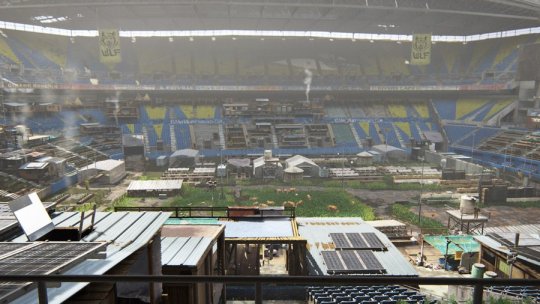
I gotta say, this blew my mind when I first saw this as Abby. The WLF really have their shit together. Multiple power sources, a bunch of the resources FEDRA left behind, and multiple food sources. The field has cattle, sheep, and chickens plus some farming. On the steps they have even more areas for farming. They have a way to collect water, and even people to design and string up their logo everywhere.
It makes sense, supposedly thousands of people live here (you can't see it unless except via glitch, but there is also baseball stadium immediately next to this that they might also occupy).
We only see where Abby and other soldiers (perhaps squad leaders?) live. They have a pretty cushy life, two per luxury box (the rooms NFL teams overcharge for that run along the upper level of stadiums). Mel also mentions a special area for young families, I wouldn't be surprised if these areas were further divided. Perhaps there is also housing for larger families and single people who aren't soldiers or squad leaders. I very much wonder if those who join the military get better housing than those that work as farmers (or dishwashers, teachers, laundry washers, cooks, etc.). As mentioned earlier, Abby and Manny live in a luxury box, and there are 112 of those in the stadium this is based on. That's housing for 224 people, if they all live like the people in Abby's hallway. That would mean there has to be more housing in other parts of the stadium.
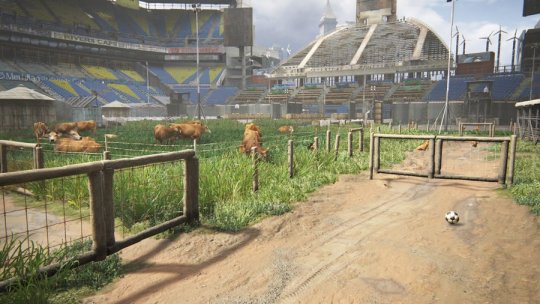
This stadium was once used by FEDRA, and you can see the concrete barriers they left behind along the edge of the field. They have to have more cattle than this, to feed all the people that supposedly live under the WLF. There is farmland around the stadium (more on that later), so maybe they mostly let them graze out there, then move some in when they plan on slaughtering them soon.
I love that they have wind turbines AND solar panels. You can see the influence that the Fireflies had on Issac and the WLF, they really focus on stability and restoring what was lost (at least when it comes to comfort). So they have electricity, sustainable food sources (and multiple kinds too), and a way to collect water (you can't see it in this shot, but they use a system similar to Jackson's, just on a much wider scale).
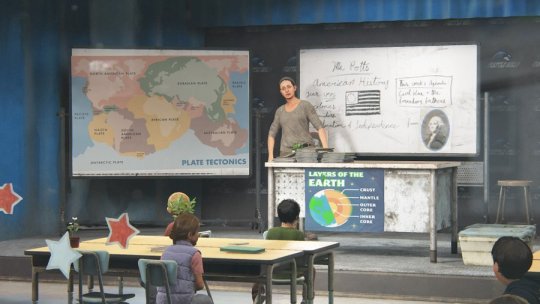
They teach a curriculum similar to what was taught to kids before the outbreak. We only see two classrooms, but from what I can tell they try to give the gives the type of education they could have received in the old days (as best they can, at least). Both the teachers you see are pretty young, which makes me wonder who taught them.
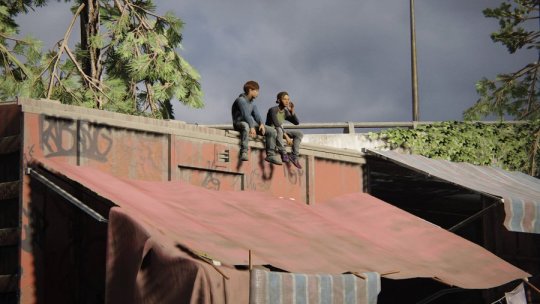
Most of the kinds you see in class are pretty young, like less than 10. These look a little order (they are outside the stadium in the market area, which I will talk about more a little later). I wonder how long WLF children are required to attend school (I think I saw a sign for 1st through 6th grade, so at least that?). I imagine they get a basic education with some broad looks into various topics, and maybe the ones most apt for study are selected to do specialized careers like teaching or meteorology. Other children are probably pushed into farming or the military portion of the WLF. Regardless of what they study, they probably also get a heavy dose of WLF propaganda. That aligns with how gung-ho many of them are to fight.
I wonder if military service is compulsory, like everyone has has to do at least so much time and then they can do other things if they want. Or maybe they make it so you don't have to fight if you don't want to, but those that do get better perks.
Most of the WLF you see appear to be in their 20's or 30's, or at least the fighters. That would mean they have spent most (if not all) of their lives under military rule, and they would have a special allegiance to the WLF since they manage things so much better than FEDRA did. Plus, you know, all that propaganda. I imagine they are told a lot about how the WLF is restoring society and how the WLF saved them from FEDRA/Scars/infected.
Sorta related, I thought of an WLF AU. Ellie grows up in Seattle under the WLF, perhaps with Riley and Dina and the other characters from canon. So many interesting things can be done with this, but that's for another post maybe.
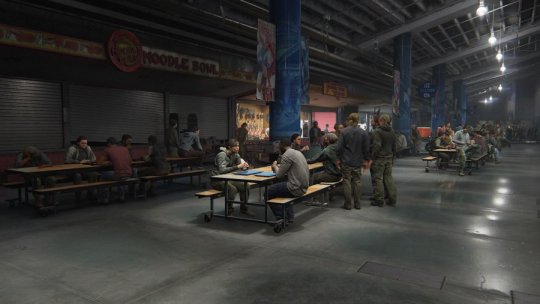
This is one the cafeteria's the WLF use. I believe this is one of a few, although this is the only one you see. There is also a butcher and small market for clothing and items here too. They prepare food here, but I think the majority of cooking is done in an area set up for it in the stands.
They have posted meal times for groups A-F, and separate meal times for children and the late night patrol. So maybe this is the only cafeteria? Each end is blocked off, so maybe they use some of the corridor that circles the stadium for more living quarters.
This is also community space where they can play games, chat, or read. There also seems to be a mix of soldiers and other workers eating together, as well as young families (there is at least 1 or 2 women with young babies in here).
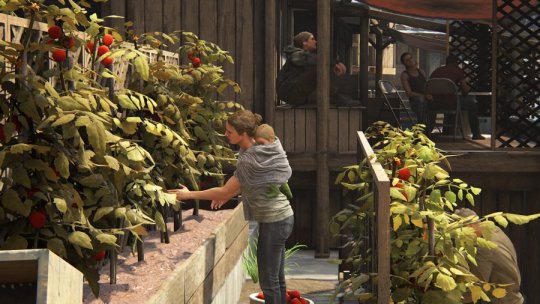
This little detail was super cute to me, but it also tells you a lot about WLF society. Everyone has a job to do, there is a role and place for everyone to contribute.
I'll talk more about this in another post (titled "It's Silly to Call a Post-apocalyptic Group 'Fascists', but Still the WLF Is Pretty Messed Up"), but an important thing to remember about the WLF is that everything comes down to Issac. He has the final say on everything, he makes all the major decisions, he picks squad leaders, he decides who needs to be punished, he's basically the Supreme Leader. Issac has been shown to be somewhat progressive with some things (you can follow whatever religion you want or none at all in the WLF, the WLF has no problem with LGBTQ people, you can get medical waivers for military duty, they provide support for pregnant women and parents, etc.), and in other ways he is very much the opposite (he punishes anyone who disagrees with him - this could be a relatively light punishment of a crappy assignment or it could be a beating, then there's the whole attempted genocide thing). Anyway, my point is that there are good things about the WLF, but also there is a serious darkside.
Anyway, when I saw this lady and her baby I immediately thought of Dina doing this with JJ while she gardens.
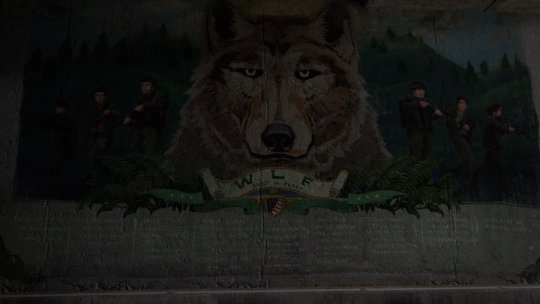
I absolutely loveeeee this little detail. A mural for the fallen. This really reminds me of some stuff you could see today, just replace the wolf with an eagle and make the uniforms camo.
There are 46ish names on this wall, so I wonder if it is continuously updated or if there are multiple murals, because they definitely have lost more people than that over the years. Also, there are about 150 people at the FOB (the amount of bodies at the FOB, yes I counted) that will need to be added. Maybe the war with the Seraphites just really exploded in the last few weeks (or maybe longer) leading up to Ellie's arrival.
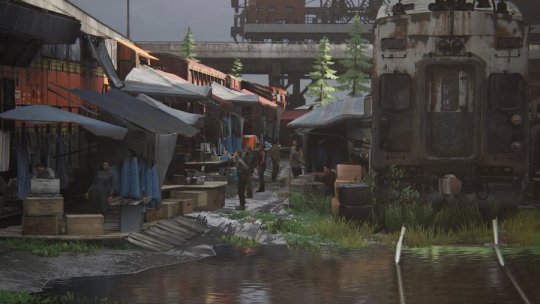
I love that you can pause during the ride with Abby, Mel, and Manny to look around the outside of the stadium. Immediately outside there are train tracks and what appears to be a large market running along side of it. This is on the west side of the stadium, I believe. A major highway intersection is also nearby.
The market has all sorts of goods, food, gas, clothing, cleaning products, TVs and other electronics, records, and even more. I wonder if this is some sort of intake area for any goods they bring back to the base. But who runs these little shops? From some notes you can find we know their economy runs on trade, so how does this work?
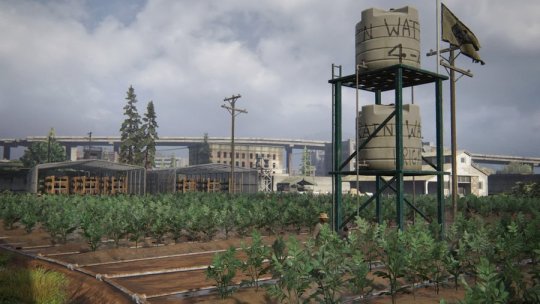
Once you get past the market area, you see a pretty vast section of farmland. I loved this shot because it also shows one of their rain water storage areas. They mark this water as to be used only for irrigation, so they must use something else for people to drink and bathe with. Or maybe they just filter some water for people to use, and the rest goes to the plants.
In the background you can see the wall and a guard tower. There is a larger wall (like much larger, I'm talking maybe 5 stories) around the QZ, and a smaller one that runs around the stadium.
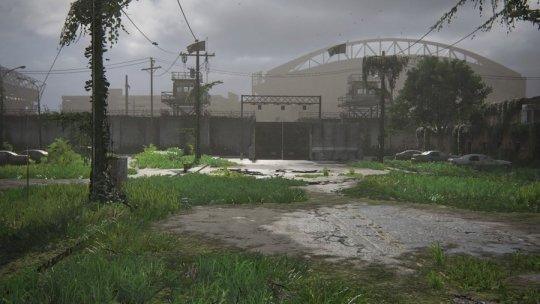
This is labeled "Checkpoint #4", so I'm not sure if that means there are other gates, but this is the only one we see in game.
The wall is pretty thick, and you can see these guard towers spaced out all alongside it (much like in Jackson). Once you leave the walls you are immediately surrounded by the wasteland that is post-apocalyptic Seattle.
#The amount of detail they put into this game is insane#I can see why it took so long to make#The WLF's base is probably my second favorite place outside of Jackson#But there isn't a lot of competition#WLF thesis stuff#I have spent way too much time thinking about this game#the last of us 2#WLF
50 notes
·
View notes
Text
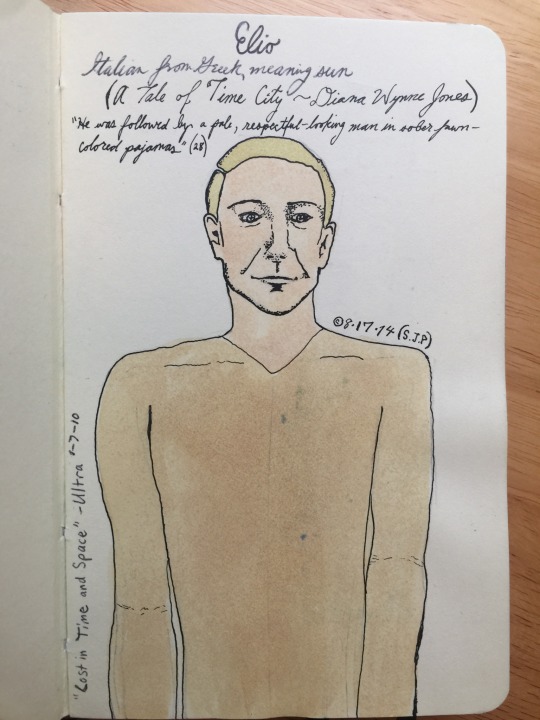
A Tale of Elio and My Fixation with Lovable Androids
TL;DR Feel free to scroll past this unless you’re keen to read my ramblings about androids, Neoclassical art, children’s lit, and bad science fiction movies.
Since the late 1990s one of my favourite books has been A Tale of Time City (1989) by Diana Wynne Jones. It’s a mildly confusing story but engaging, with memorable characters, including the android Elio, pictured above - my own fan art from a few years ago. Studio Ghibli really needs to make this film if no one does a live-action version, seeing as they brought Jones’ novel Howl’s Moving Castle to life. Here’s a scan of my favourite edition with mesmerizing cover art by Richard Bober.
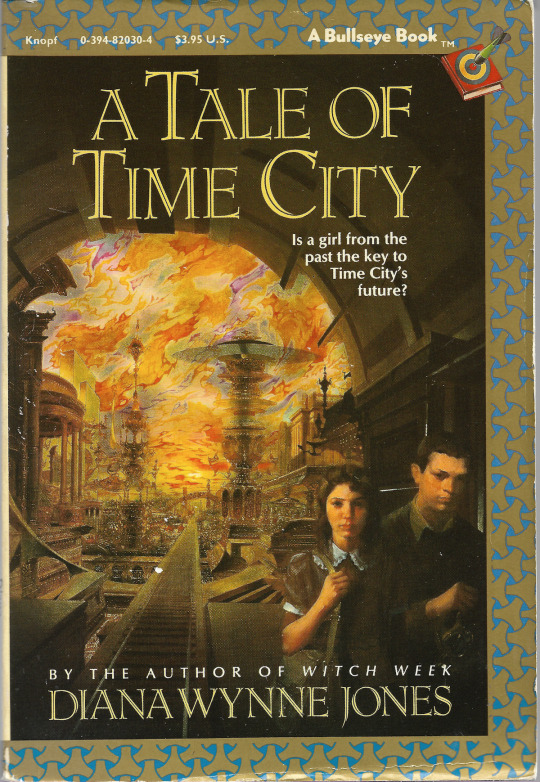
This book inspired me so much I’ve done research on it. I wasn’t in a class in grad school that allowed me to write about it so I took it on as a casual independent project in 2019. Two days after my dad died of cancer I was scheduled to present my paper on Elio from ATOTC. Needless to say I was not able to finish writing the essay. I told the department coordinator I would likely not attend but I would let him know. He was seriously surprised that I showed up. I must have looked like a ghost - wearing a nice top, skirt, tights, and short heels. I was still in total shock but I thought I might as well press on. My paper’s working tile remains as it was: Elio: Android Autonomy and the Personification of the Sun God. I presented a long bullet point list of working ideas and research done up until that point. My work is still on the broad side because it’s an intersection of young adult fiction, Neoclassic art, and android autonomy; I have some narrowing to do. Here are my main arguments thus far:
Firstly, the android character Elio’s physical characteristics and personality are inspired by Helios, the Hellenistic Greek god and personification of the sun. Apparently, Elio is a Spanish name meaning sun and also an Italian given name referring to the element helium, originally derived from the Greek name of the sun-god Helios.
Secondly, Elio and Helios share more than an etymological connection and the comparison of Elio to Helios can be articulated in two distinct ways: the aesthetic comparison, and that Elio possesses some of the qualities Helios is known for. Jones’ work repeatedly associates Elio with sunlight and golden hues, aspects which are exemplified in the 1765 Neoclassical painting Helios as the Personification of Midday by Anton Raphael Mengs. (I vaguely remember translating a couple passages from a large art book written in German when I was studying Neoclassical art.)
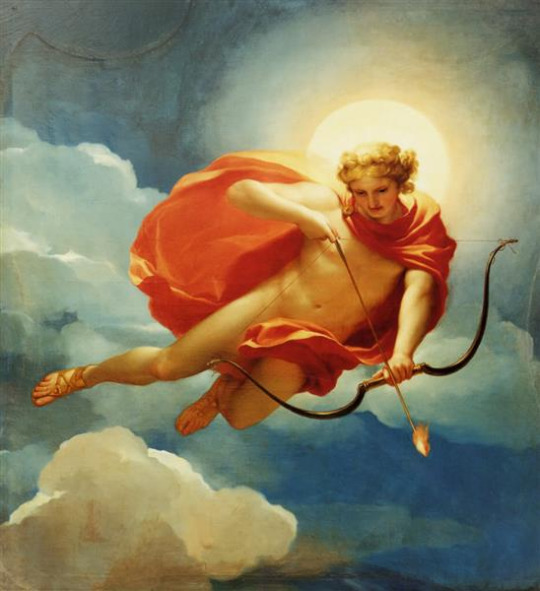
This work is considered an unusual depiction of Helios. Mengs uses a motif of the glowing arrow which is interpreted by François-Xavier Fabre as a symbol of the midday heat and the sun's rays which penetrate and give light to the earth. The representation of the sun in this way is considered unusual for the 18th century because it goes against Classical and Baroque iconography which portrays Helios riding a chariot. Ironically, Jones references this. Elio proclaims his fondness for films, particularly the chariot race from Ben Hur. Elio, like Mengs’ depiction of Helios, lacks a chariot but retains his beauty and powers.
As for Elio possessing some of the qualities of Helios, the god is often referred to as “all seeing” or “Zeus’s eye.” Similarly, Elio has the ability to anticipate problems and see what humans do not, but not because he’s a god, but because he’s a servant. However, this is where his self governing comes into play when he uses his observations to take action beyond any directives he has been given. His physical strength, like Helios, exceeds that of humans. Elio himself says, “my utmost is more than twice that of a born-human” (Jones, 211).
Thirdly, Elio’s self awareness allows him to use both his powers of observation and superior physical strength independent from humans. He does not always wait to be told how to use his power; he wields it. Not only does he play a part equal to that of humans in Jones’ plot, he specifically controls the fates of certain human characters. For example, he doesn’t always utilize his speed when he’s at the beck and call of his master, Sempitern. He makes choices not to fully comply with the demands made of him.
My fourth point, which I can’t quite articulate well, is that the most significant dynamic of this comparison is the body of Elio and how his physicality interacts with his autonomy. Elio acts as an individual who contributes to a wider mythology just as Helios does. Yet, while Elio is superior to humans in many ways, his quasi-humanity allows him to act in ways which align with Helios’ qualities.
For example, Elio makes personal choices and exhibits emotions not necessary for him, as an android, to function. He confesses a desire to harm another android out of annoyance where a passionate opinion would not be expected from an android. This human failing is indicative of the same autonomy which allows him to act as Helios does. Elio has been constructed as a superhuman body in terms of his abilities, however, the human qualities which contribute to his Helios-like powers undermine his intended purpose.
Ultimately, Elio ascends the usefulness of his “owned” body by acting independently from the humans who utilize him. His human qualities make him vulnerable and therefore he loses some of his godlike powers. Elio, while only an assistant to his human owners, utilizes his own physical and mental powers to maintain his autonomy. Conversely, his god-like qualities make Elio more human rather than affirming his android identity.
This is a very complex subject and I don’t really know where I’m going with it and have possibly made some suppositional errors. TL;DR: What I do know is that Elio presents a paradox: being idealized for his abilities allows him to be autonomous while being autonomous disrupts the servitude of his body.
I am in the process of determining what lens I will use to analyze Elio’s experience and functionality of being an android. I’m thinking about using Alan Turning’s 1950 work Computing Machinery and Intelligence. I’m still navigating the literary theory aspect, or indeed philosophical aspect, of this area of study.
This brings me to something I came across later that relates to Elio and ATOTC.
SPOILERS AHEAD
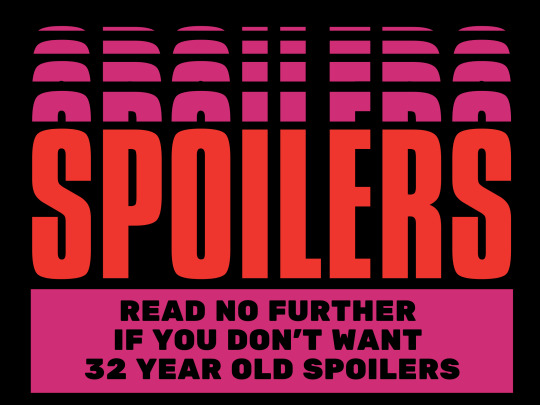
The closest depiction of an android that I’ve seen to Elio other than Data is from a terrible and somewhat forgotten science fiction film from 1989. “Byron”, (played by pre-Jurassic Park-fame Bob Peck) the android in the painfully awful film Slipstream comes very close to Elio in terms of tone, attitude, and characterization. Despite the embarrassingly bad script and dialogue, Peck does a bang-up job, seemingly acting in a wonderful film running parallel to the absolute trash his co-stars were apparently “acting” in. Yes, I rewatched this film just to write this analysis. (The secondhand embarrassment is off the charts and I had it playing at a low volume most of the time Byron was not on the screen.)
When you first see Byron he’s acting out autonomy but you’re not aware he’s an android. The audience is told he’s an escaped fugitive, a murderer, and that’s all we know for over half the film. Yet there are several clues. When you first see him he’s running over rugged terrain in a suit which was kind of a big hint but nothing makes sense in this film so I just thought that it was a weird costume choice. Then he’s literally shot with a grappling hook. He doesn’t seem to be in pain even though he’s shocked by it, and then is pulled down by a bounty hunter named Tasker (Mark Hamill) and hits the ground from a great height and doesn’t die. He just quotes what I think is John Gillespie Magee, Jr.’s "High Flight”: “I have slipped the surly bonds of Earth….and touched the face of God.” Next time you see him, he’s in handcuffs, looking super depressed, and apparently not bleeding out from the now absent grapple hook that’s gone through his forearm.
He eventually quotes Lord Byron to cryptically indicate his name which is lost on Bill Paxton’s character, Matt. “Byron” essentially means cowshed. It’s ironic because Byron the android is in many ways a receptacle of knowledge. Matt even says sarcastically, “Well aren’t you a walking storeroom of information,” and Byron responds cheerfully, “Yes.”
Byron breaks out of his handcuffs saying they’d “become rather superfluous.” You think he’s just showing off but once you know he’s an android you know he’s just honest all the time. He then heals a blind child and paraphrases Psalm 127:3. Matt says, “I didn’t know you were a healer.” Apparently Byron can perform cataract surgery in less than five minutes. Along their journey together (Bill is set on collecting the bounty on Byron’s head before Tasker can catch up) they camp out. Byron sleeps with his eyes open. (Even if he is an android wouldn’t his eyes need to be “cleaned” in the same way humans need to close our eyes and blink?) Matt wakes up to find Byron seemingly strangling him. “I was feeling your carotid pulse,” he explains. “I was just checking for arrhythmia and episodes of ventricular tachycardia.” At this point you realize he’s not so much a spiritual healer as a doctor who philosophizes a lot.
Byron’s miraculous behavior and pontificating is called into question by a nomadic spiritual community which has been torn apart by an attack on their village. As he lays dying, Ben Kingsley’s character calls Byron a “false prophet” but his faith in this stranger is somewhat restored when he says, “all that will be left of me is bits of gold in the sand. You have a soul, do not abandon it in death.”
Another character says, “The stranger is no mortal man.” Therefore it is clear that Byron likely isn’t human. We don’t find out he’s an android until 46 minutes into the film. Once that’s cleared up, other concepts arise in the script. While not well executed, they are really interesting; emotion both positive and negative, free will, perfection, A.I. slavery, and murder are all addressed throughout the second half of the film. Byron says he doesn’t understand “hate” in context of his “master” to whom he was nurse, brother, father, mentor, and friend, but he admits he was more of a slave than anything else.
The character Ariel takes an interest in him for a variety of reasons, especially romantically. In one very evocative moment we see Byron in a museum exhibit, a false garden of Eden, full of fake vegetation and taxidermies, full body mounts. So we’ve got an android having an Adam experience. Whether or not he experiences “original sin” with Ariel or if he’s “fully functional” is never acknowledged. Although one woman says, “Amanda slept with a robot?!” (who the f**k is Amanda?!) and a man says to another sitting next to him, “I hear they’re rather mechanical in the saddle.”
Byron is less concerned with consummation and more excited about love, sleep, and dreaming. When he is with Ariel he doesn’t quite know how to act in terms of sexual play and then apologizes: “I’m not accustomed to being loved.” We see him closing his eyes when he’s cuddled up with Ariel; the next day he is certainly very pleased that he fell asleep with his eyes closed and had a dream.
In terms of his servitude and autonomy they did not spend an adequate portion of the exposition on it. Matt has a change of heart and says instead of collecting the bounty, he’ll set him free as it’s briefly revealed that Byron killed his “master” upon the man’s request. Naturally, this brings up a lot of confusing feelings for Byron. “Is this what it’s like to be human? I don’t think I’m up to it,” he says. “Can I be trusted with human feelings?” And in a way he cannot. Ariel is brutally shot by Tasker.
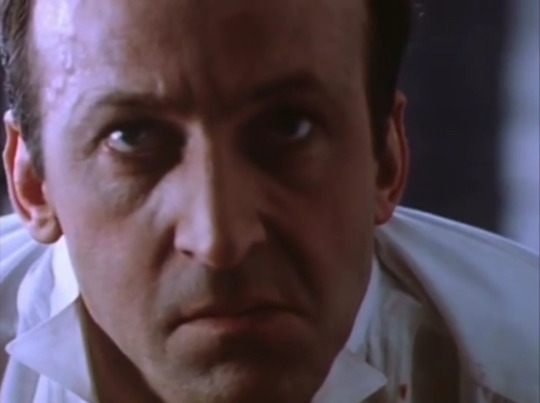
Byron is angered over Ariel’s death and follows the bounty hunter to his ship. Instead of taking him in to collect a reward, Tasker tries to run him down with the glider plane. Byron manages to get himself caught in the engine and starts to strangle his assailant. Tasker quotes “touched the face of god” which brings Byron to his senses and he stops killing Luke Skywalker Tasker and tries to save the plane. It looks like he’s going to hot-wire it but then uses the wires like reins (chariot imagery???). They crash into the side of a mountain slope. Tasker dies but Byron survives. Apparently he’s basically indestructible and somewhat godlike. “I’m too dangerous to be human,” Byron tells Matt. In the end, he goes off in search of the place he’d been dreaming about.
Although in terms of physical appearance the two androids are vastly different, they have so much in common. Here are some basic concepts.
Character: Both are stoic, formal, intelligent, honest
Indestructible: Byron is injured with a grappling hook, takes a major fall of about 20 or 30 feet without a scratch: he is somewhat godlike or slave-like, meant to withstand destruction and pain. Elio is less indestructible but easily repaired.
Healer: Byron has the skills to heal people with basic surgery. Elio doesn’t take his own injuries seriously and experiences pain for the first time (Jones, 218-9).
Both think they deserve to be punished: Elio states this quite clearly (Jones, 276) and Byron says the same thing about himself with resigned passivity.
Complex relationship with “human emotions”: Both come to terms with violence, anger, and love.
Autonomy: At the end of the film Byron goes off on his own to look for a promised land. Elio decides his own fate by deciding to accompany the children of the story, stating that Vivian is a “particular favorite” of his (278).
Dreaming and stories: Byron is searching for a place, “where I think I belong,” he says, which is a place he often thinks and dreams about. Dreaming is considered to be a human attribute, a non-essential bi-product to consciousness. Elio enjoys stories and old films (Jones, 180), similarly “human” in nature.
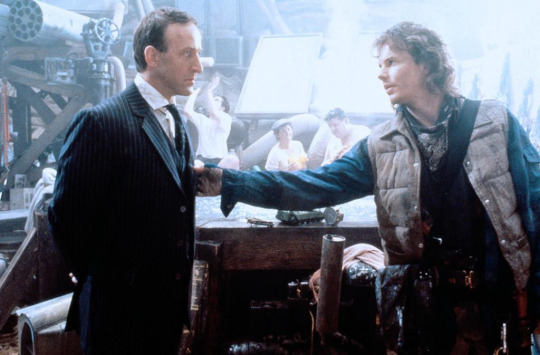
(Peck, seen here waiting for Bill Paxton to learn how to act. Sorry, I’m salty.)
Disclaimer: This is a work in progress! This project is an intersection of niche subjects that interest no one but myself.
Anyway, my point is (yes, I did have a point...or rather several) was that if anyone should adapt A Tale of Time City, Byron from Slipstream is the best example of how Elio should be portrayed in terms of characterization. I feel that Slipstream should have been centered around Byron. The film was kind of like, just about the “we’re both fighting over the bounty of this fugitive” sorta thing. It would have made more sense to focus on Byron as he is arguably the most interesting character and represents many of the conflicts within the story. I would like to combine my research on ATOTC and Slipstream one day. In any case, this is a good start.
Works Cited (WIP)
Jones, Diana W. A Tale of Time City: Knopf, 1987. Print. Perkowitz, Sidney. Digital People: From Bionic Humans to Androids. Washington, D.C: Joseph Henry Press, 2004. Print.
Roettgen, Steffi, and Anton R. Mengs. Anton Raphael Mengs: 1728-1779 Part 2. München: Hirmer, 1999. Print.
Turing, A. M. “Computing Machinery and Intelligence.” Mind, vol. 59, no. 236, 1950, pp. 433–460. JSTOR, www.jstor.org/stable/2251299. Wilson, Eric. The Melancholy Android: On the Psychology of Sacred Machines. Albany: State University of New York Press, 2006. Print
#A Tale of Time City#Diana Wynne Jones#my artwork#fan art#art#grad school adventures#Slipstream#c3po#neoclassic art#tldr#long post#personal#Richard Bober#book cover#my scans#my fan art#Bob Peck#1989#my edits#androids#writing#essay#grad school#AI
36 notes
·
View notes
Text
Late Night, a feminist review
This is another old essay, on my favourite movie Late Night, from the coolest class I ever took, Women in Pop Culture. Writing this essay actually made me realize I want to more closely study competitive femininity one day! I also remember this was an essay where I wished the word count was higher, because I love this movie and had a lot to say!! lol, maybe one day I will write more.
if you read, I hope you enjoy!
Mindy Kaling's first feature film, Late Night, is a dramatic comedy starring Emma Thompson as Katherine Newbury, the only female late night talk show host in America. Kaling co-stars as Molly Patel, an Indian woman selected as a diversity hire for Katherine’s writing staff. The film is a pointed remark on the lack of diversity in Hollywood writing rooms, as well as the cultural shifts that are bringing about change in the industry. Molly Patel’s intersectional feminisim not only builds her relationship with Katherine but also attests that a truly feminist character has less limitations than most depictions of empowered women.
Five minutes into the film, we see Katherine Newbury fire one of her writers after he asks for a raise because he has just had a second child with his wife. Katherine is more than pleased to inform him of why this is a sexist request. “You’re asking for a raise, not because of any work-related contribution,” she says, “but simply because you have a family. And that’s why in the 1950’s, family men were promoted over the women they worked with.” It is understood from this scene that Katherine approaches the world from a place of education and with feminist intent. However, the writer she is firing quickly retorts, “There are no women on this staff. And the reason there aren’t any women is because you hate women.” This is a shock for both Katherine and the audience because, how can a self-proclaimed feminist be accused of hating women?
An internalized competitive feminity is revealed in Katherine. Angela McRobbie explains competitive femininity as, “an amplification of control of women... so as to ensure the maintenance of power structures...Feminism, at the same time, is made compatible with an individualising project and is also made to fit with the idea of competition” (McRobbie, 2015, pg. 3). Katherine is the only female late night host in television, yet she is an upper class, white woman. Her economic background alone allows her to occupy a place of privilege in a system that relies on the oppression of the lower classes. While it is a triumph that Katherine is a successful female host, she fails to reflect on possible extensions of this triumph, such as hiring other women for her staff. Therefore, Katherine’s feminism is a self-serving feminism. “It seems then there is a battle to ensure that the new popular feminism which emerges or which holds sway is one which discards the older, welfarist and collectivist feminism of the past, in favour of individualistic striving” (McRobbie, 2015, pg. 4). Competitive feminity is a sly instrument in our society. It allows for the success of certain women over others, while leaving “the existing patriarchal regime relatively untouched” (McRobbie, 2015, pg.17).
As the media we see often reflects certain aspects of the society we live in, Mindy Kaling is making a purposeful statement that writing rooms in the entertainment industry are disproportionately white, male and upper class. As Douglas Kellner details in, “Cultural Studies, Multiculturalism and Media Culture,” the entertainment industry plays a massive role in our society’s culture. “Media images help shape our view of the world and our deepest values...Media stories provide the symbols, myths and resources through which we constitute a common culture and through the appropriation of which we insert ourselves into this culture” (Kellner, 2015, pg. 7). It is important to view Late Night with a cultural studies perspective. Kaling’s character Molly Patel is very clearly both a fan and critic of popular culture, and Katherine Newbury is considered an international icon. Furthermore, Andi Zeisler, in “Pop and Circumstance: Why Pop Culture Matters,” demonstrates the significance of examining phenomena such as cultural icons “in the context of its social value, influence and ideology” (Zeisler, 2008, pg. 5). We see examples of strong cultural reactions in Late Night when Katherine receives negative backlash from both journalistic and social media for attempting to embarrass one of her guests, as well as having an affair with one of her writers. This is because Katherine’s status as an icon places her in a space of perpetual examination.
The introduction of Kaling’s character, Molly Patel, is the biggest shift in the plot. Molly is the opposite of Katherine in that she is exceedingly earnest, prone to hesitation, attended a community college and is not white. Bell hooks identifies from her experience teaching cultural studies that, “everyday folks from all walks of life were eager to share thoughts and talk critically about pop culture” (hooks, 1994, pg. 4). If we understand popular culture and its various productions paired with its widespread influence, what can possibly justify the fact that it is dominantly created by white, upper class men, and not a more accurately diverse portion of the population? Molly raises this issue in the film, urging Katherine to use her perspective as a woman in her comedy. Soon, the entire staff is branching out their writing in order to be more embracing of their audiences. Although it is a comedy, not a superhero film, a connection can be drawn to feminist heroes and how they achieve their goals through collective effort (Curtis and Cardo, 2018). It is in this way that Molly represents a more inclusive feminism. Her question of, “how can I help make this show better?” comes from a headspace of feminist unity. Not like Katherine’s earlier self-serving feminism, Molly asks, “How can I help further the cause of feminism?”
Ultimately, Late Night is an incredibly funny film that successfully tackles feminist and cultural issues. There is room for more than just one empowered woman in the film, and they experience their empowerment in unique ways. Initially, Katherine Newbury’s competitive femininity limits her, and this contrast in her feminism is a reminder of our society’s culture. As bell hooks states, “we must be willing to courageously surrender participation in whatever sphere of coercive hierarchical domination we enjoy” (1994, pg. 6). The introduction of Molly Patel and her desire for a more inclusive and diverse work environment proves that the best way to act as an empowered woman, is to lift up and empower those around you.
15 notes
·
View notes
Text
You Are My Hero (2021) Review
Overall impression: The drama started off really cute and promising in the first half, but was weak and underwhelming in the second half. In-depth review below (with spoilers).
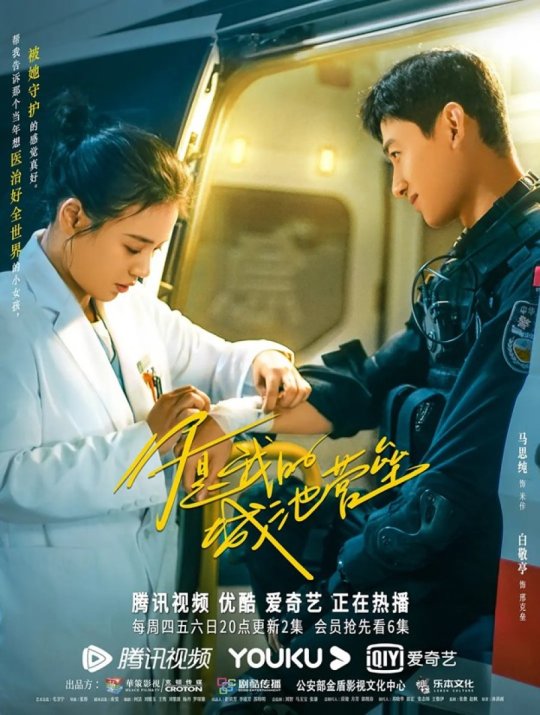
A cute and fluffy romance premise
Right off the bat, the love story between the leads is tropey as hell, but manages to not be tacky and is actually really endearing. The ML, a SWAT officer, rescues the FL, an aspiring neurosurgery medical resident, from a bank robbery 2 years ago. They leave a lasting impression on each other, but don't keep in touch afterwards. The FL never sees his face because he's wearing a mask, but the ML remembers her name.
Fate brings them together again 2 years later when the FL enrolls in an emergency rescue training camp that’s supervised by the ML. He recognizes her and falls for her immediately, but she doesn’t know he’s the one who rescued her years ago.
Their relationship starts off rocky, similar to how a CEO romance would start: the ML first appears cold and distanced, strict and brooding, but actually has a huge soft spot for the FL. The FL is put off by his coldness, but is sometimes surprised as random moments of tenderness. When the training camp is complete, the ML becomes a cute and awkward lovesick puppy who tries to figure out how to woo the FL because this is his first time (and hers) falling in love. It’s fun seeing him become so flustered around her when he’s usually so calm, collected, and in control as the leader of a SWAT team.
On other hand, the FL slow falls for the ML when he reveals a more real and vulnerable side of himself. They banter a lot, but she slowly warms up to him.
And as a no-nonsense drama, the two leads acknowledge their feelings for each other quickly (although they haven't directly admitted it to each other yet). They're in the awkward phase of attraction and going on semi-dates, but they haven't defined the relationship yet. *Sigh* First love.
Things I enjoyed
I appreciate that although the FL is a Mary Sue, she does make mistakes. She's smart, but she isn't the top of her class. She’s kind and selfless, but she also isn’t overly tolerant of people. When people overstep their boundaries and are unjust to her, she’ll confront them. Ma Sichun is such a natural actress. She can do cute and flirty, she can be clueless and lost, she can be confident and in control, she can be angry and indignant. I especially loved her character’s adorable interactions with her best friend Xiao Xia.
The acting in this drama was all around great. It’s probably the best part of the drama. It was so comfortable and fun to watch. I think AvenueX described it best: the acting in the drama was so natural that sometimes it felt like the actors broke character but the director kept the take. Some of the laughing, giggling, and gestures felt so genuine that you wonder if it was improvised, scripted, or a blooper scene that became canon.
I like how the FL and ML are each experts in their respective fields. They have very separate careers that occasionally intersect. I'm tired of CEO dramas where the FL is working for the ML, or there are class differences between them. Instead in this drama, the FL faces problems everyday at work that the ML doesn't know about. Her problems do not relate to him at all. She has problems that he can't understand or help with. Likewise, he also goes on missions that she isn't aware of. They work in completely different fields with different skill sets. They even talk about how their philosophies differ. Her job is to save lives but not make moral judgments of character, while his job is to enforce the law, which is all about assessing character. Where their careers do intersect, is the goal of saving others and putting others first before themselves.
Another dynamic of the relationship that I really like is that the FL and ML are always occupied and on the move because of their professions, and yet, their loyalty and devotion to each other never change. They are each other's rock. Despite encountering so many different situations and people, despite all of the chaos and noise from their careers, nothing can really outweigh how important they are to each other. Despite being out in the field, far away from home, their hearts are anchored to each other. I just like this trope a lot, i.e., the trope of being away from home, but remaining true and loyal and unwavering. Despite having bigger and more important things in the world to deal with, their ultimate dream is wanting to just spend some time together. It's analogous to how in ancient period dramas, there are generals who command armies and and maintain a strictly professional demeanor and don't mention a word about their family to their soldiers, but when the general retires to his tent at night, he's writing a long and thoughtful letter home, because his loved one was on his mind all day.
The supporting characters are great, but I do like the older and mature supporting couple (Xing Ke Yao and Shao Yu Han) more than the younger supporting couple (Xiao Xia and Shu When Bo), despite the actors playing the younger couple being literally my age. I also appreciate how the FL has multiple close friends who are quite separate from each other, instead of just the single token sidekick best friend (although the second half of the drama does just focus on one of her main friends). It's relatable because we all have different groups of friends. We have friends from high school, we have friends from college, and we have friends from work. Most of these friends are kept separate, and sometimes they interact. But I like how this drama shows that the FL has a small network of friends from different walks of life.
Things I didn’t enjoy as much
The plot derailed and lost its charm after episode 30. There were fewer hospital cases, and the ML had to complete a mission that I had no interest in following. There was no other point to the superfluous mission besides to show that the ML has a busy and demanding job that prevents him from being at the FL’s side when she needs him the most.
I also really, really disliked the introduction of the random love rival in episode 31 just to try to stir some angst. The plot device was pointless because in the end, there was no angst because the leads have a strong and healthy relationship, and so the love rival’s attempt at sabotaging the relationship was just laughable and completely random. It just disrupted the mood and pacing of the drama because that plotline just came out of the blue. It was just so annoying seeing the love rival and her sister cause trouble and wreak havoc in the FL’s workplace.
The drama did a good job at showing how the leads put their careers first, which caused strain and tension in their relationship that they tend to ignore. But, the drama never explores this further, even though it’s a very real problem that many career-driven and ambitious couples face. The drama presents a very idealized vision of a relationship between a police officer and a doctor. Like when the FL leaves for a special research and training program in the States, the drama shows that the leads breezed through the two-year long distance relationship in a quick montage. They had no issue in communication. Yes, they miss each other, but they’re blissful. But what kind of long distance relationship has no bumps in it? The drama also implies that they never saw each other in person during two years (in the final episode, Xing Ke Lei squeezed her arms and said that since they haven’t seen each other in 2 years, he had to check if she was missing anything), which is highly unrealistic. Was she never able to go back home for the holidays? Did Xing Ke Lei, whose parents live and work overseas, never bother to visit his girlfriend? Overall, it seemed a little off to me that despite the budding tension and issues they’ve been having between them, they were able to overcome a long distance relationship so easily. You could argue that they’re used to long separations because of their work, and the drama has shown that they’re used to communicating over video calls, but I was just a little disappointed that they rushed this final plotline when so much more could have been done with it.
Speaking of parents, we never actually got to see their parents. I understand that the parents are not relevant to the focus of the story, but the parents are rarely even mentioned, which further makes the romance in the story seem too idealistic. Whether it’s a near-death situation, getting engaged, or studying abroad for 2 years, the FL never mentions talking to her parents about these decisions and life changes. The drama handwaves the parents’ absence and lack of influence by having the FL mention early in the drama that her parents are busy with their business back home, so they don’t have time to worry about her. She also no longer bothers to update them about her work because she’s afraid they’ll be worried about her. And then from there, we never hear the FL mention her parents again. It’s just so weird to see that the most important person in her life is the ML and she only ever talks about major life choices with her friends. I mean, if the plot had said that she didn’t have a family, it wouldn’t have mattered. But the fact that she does mention her parents, but they’re completely absent and non-existent just felt a little off, like something was missing. But in the grand scheme of things, this is not really an issue. I’m just nit-picking.
Lastly, I just want to comment on Bai Jingting as Xing Ke Lei. I admit that he sells the part well. At first I was skeptical about Bai Jingting as a SWAT officer because of how skinny and baby-faced he is, but he actually pulls it off surprisingly well and has some unexpectedly good chemistry with Ma Sichun too. Although during moments when he isn't talking and we're just left with his resting face, I'm suddenly hit by how young he looks, but then he speaks or is back in uniform and again, the gestalt shift goes back to Xing Ke Lei, the handsome SWAT officer. They made a point of showing how muscled his arms are, which was a little jarring to see in comparison to his youthful face, not gonna lie. So, while I liked him as Xing Ke Lei, it was a little distracting switching back and forth between seeing him as a really young, adolescent-looking actor, and him as the broad-chested character.
Should you watch?
All in all, a really cute and easy-to-watch drama with some thoughtful and sentimental moments. Very fluffy. Minimal to no misunderstandings. Charming characters. There are the storylines of three couples with medical/police subplots interweaved between the romance. On bilibili, some people even edited clips of the drama with theme songs from TVB medical and police dramas like The Hippocractic Crush and Tiger Cubs. So, as someone who grew up with TVB dramas, it was nostalgic to see those thematic parallels.
But, the drama does lose steam in the last 10 or so episodes, and has a lot of filler to stretch it out to 40 episodes. That’s the issue I have with modern dramas. The plot in modern dramas is usually quite basic, and I would argue that the modern romance is easier and less angsty. You either love each other or you don’t. You either are willing to commit or you’re not. There aren’t many external excuses for angst or misunderstandings. (Of course, I’m trivializing things; real life isn’t as easy).
Still, I would recommend this drama for anyone who’s between dramas. I watched this drama to help me get over the rut I was in because I was going through withdrawal after finishing The Rebel Princess, so I needed a light-hearted drama whose genre was completely different from TRP. And this drama was perfect for breaking that rut.
Rating: 8/10. Simple, fluffy, and not too much to complain about. I also forgot to talk about the great humour in the drama, but there were many moments when I laughed out loud or couldn’t stop grinning. This is also a drama you can take your time with because there aren’t constant cliff hangers to peg you on. It doesn’t consume your life, and you can pause (although, the first 18 or so episodes are definitely binge-worthy because the development of the leads’ relationship is just too cute, and so they suck you right in). However, while it is one of the better modern romance dramas I’ve watched (and the characters are very consistent), it’s not a very memorable drama. It doesn’t make me linger. I guess it’s because I’m more of a historical and xianxia drama kind of person. So take from that what you will.
35 notes
·
View notes
Text
What if Storm was Quare? Muslim?
So! Let me be clear: This isn’t a recommendation that we should do this, nor do I want to sound presumptuous. I’m just speculation on the sociological and Intersectional observations and analyses we could have of the character in these cases.
What if Storm was Quare? So, for those of you knew, Quare is commonly cited as a AAVE pronunciation of Queer, at least etymologically. With that said, Quare Studies is a little bit different than Queer Studies, though not inconsistently so. Quare refers to the racialized sexuality and the sexualized race of queer people of color. So, the question remains, what is Storm was quare? Storm is a deeply storied character, but a notable point is she really doesn’t have a classic love interest. She’s been with Wolverine, Black Panther, and Angel here and there, but it’s not like Cyclops and Jean Grey, or Rogue and Gambit, or Nightcrawler and Scarlet Witch. Storm’s love interests come and go. This could be read as her not fully allowing herself to get close to men? Perhaps she’s sapphic. Storm has certainly been both a femme and a butch over her history. Perhaps she’s not sure who she loves, or how she loves? Also, when you consider her proudness of her body, that certainly correlates with the excitement many transwomen have to show of their bodies. Plus, as an African woman, Storm would have an already harder time relating to white queers, so Quare as a racialized identity may be appealing to her? And perhaps she takes the classes and Teaches Quare Studies as an elective at the Institute? Maybe
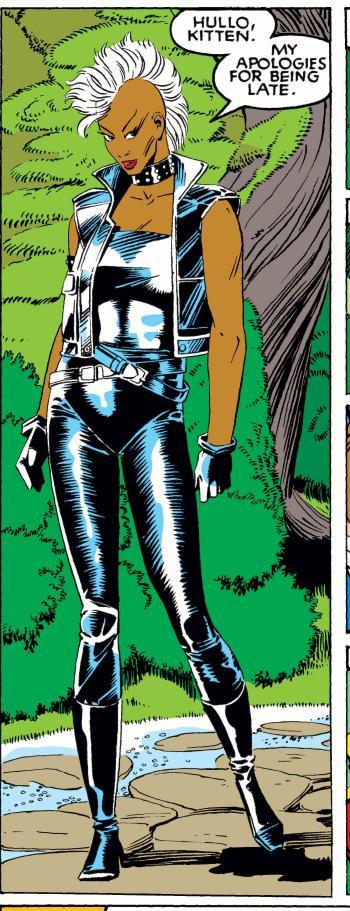
Butch Storm
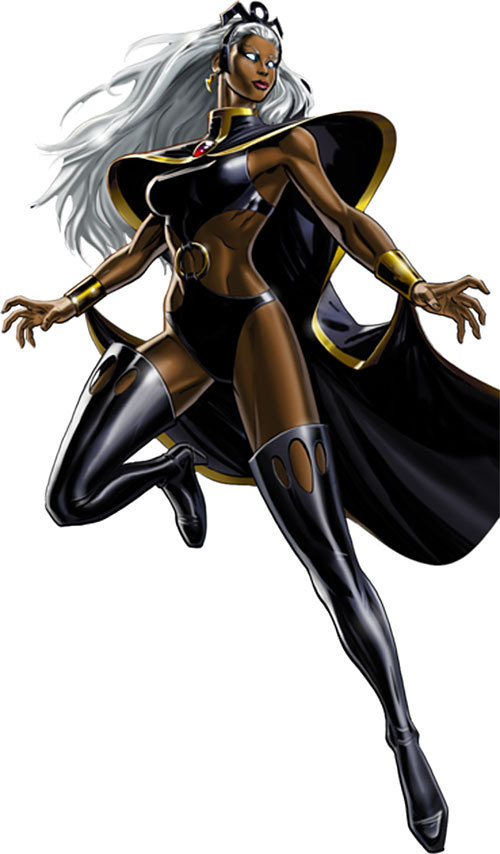
Femme Storm
What if Storm was Muslim? This is an interesting one. First thing, let’s address Islam and Africa. Storm is originally from Kenya, and Islam makes up about 6% of Kenyan’s religious beliefs, so it’s not impossible she’d get it there. Though more likely, she’d have picked it up in Egypt during her years as a homeless pickpocket (many people turn to religion during times of hardship). Now, let me be clear, I’m fully aware not all Muslim Women wear hijabs, but if Storm did, it’d be a very interesting take. Storm’s white hair is iconic, but its also been one of the biggest criticism of the character over the years. It’s mostly straight, being devoid of Black hair texture, and even keeping a Black woman from having dark hair at all has been criticized. So if a modern writer gave Storm a hijab, it’d be…not a fix exactly, but perhaps an acknowledgement of that criticism. That being said, Storm was worshipped as a goddess when she returned to Kenya, and I doubt a practicing Muslim would let that happen, so that would be a conflict (unless of course she converted as an adult)
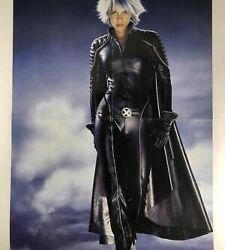
Couldn’t Storm wear this with a hijab over it?
#Storm#Ororo Munroe#Marvel#X-Men#X-Men Storm#Quare#Quare Studies#Queer Studies#Feminism#Women's Studies#Comics#Superheroes
3 notes
·
View notes
Note
Hey I'm doing a short story for class about an autistic girl who discovers she have telekinesis and I want to knows how to portray her properly and how beint autustic affect her powets with makint autism sounds baf
Hi anon! I’m very sorry if I’m answering this too late for you; I barely had time to even look at my inbox in October and November, and then when I got time to do so this month, I got overwhelmed by the backlog. Nonetheless, I’ll answer this and hope that even if it’s too late for your original purpose, something in it will help you (/help anyone else who reads this) :]
AUTISM, SUPERPOWERS & FAIR REPRESENTATION
Okay, so, the basic answer to “how not to make autism sound bad” is approach the story with compassion and/or empathy – but that’s a very broad answer and probably not overly helpful for specifics. I’ll start with the “how to represent autism well” part and then break down the superpower-specific stuff from there.
1) Autism should be an integral part of your characters’ personhood, but not their entire personality
As an autistic, I struggle to define where my autism ends and my personhood (i.e., my sense of the “self”) begins, because they’re so deeply entwined with one another. Autism is a condition that alters how I think and interact with the world, and therefore profoundly impacts how I perceive both myself and the things around me. That doesn’t mean, however, that my only personality trait is autism. It all gets very convoluted and existential – would I still be ‘me’ if you removed autism? What is ‘me’? Is it even fair to think of autism as a separate Thing? – but it is worth considering if you want to get inside your autistic character’s head.
A trap that allistic creators tend to fall into is “this character likes [X] / does [X] because they are autistic”. For example, I once saw someone say that their OC likes blue because it’s a calming colour and therefore sensory-safe. This is a valid process on its own: I also like pale blue (+ other pastel shades) because it’s a sensory-safe colour! But where many allistics fall down is in not considering that an autistic character’s likes, dislikes and hobbies don’t have to relate to their autism.
Although the show has its flaws, I do think that Sam Gardener from Netflix’s Atypical is a positive example of an autistic character just liking something because they like it. His special interest is all to do with penguins and antartic wildlife/explorations, and he also enjoys art as a hobby because... he just does. That’s not to say these things don’t intersect – he takes a scientific illustration class in college precisely because it combines two things he likes; it’s also fair to say that autism gives him an edge in drawing because autism brain is excellent at grasping theory/technicalities. But ultimately it’s nice to have an autistic character whose interests and personality traits go beyond the stereotypical special interest.
For more on representing autistic characters, check out [this post] where I go into a bit more depth. (NOTE: that post is on my list of things that I want to revise/rewrite/flesh out, so it might change soon, but the basic stuff is still the same).
2) Autism isn’t inherently “bad” – but that doesn’t mean it’s without issues, either
Autism is not the devastating tragedy that neurotypicals like to present, but it does come with its own difficulties and pitfalls that you should acknowledge if you want to write a well-rounded autistic character. There’s often discourse/debates on my dash about whether it’s fair to call autism a disability. I’d say it is – there are definitely aspects of autism that are disabling, i.e., sensory overload, burnout, trouble communicating, etc. – but it isn’t a disability in the way that allistics/abled people think.
Some aspects of autism are “double edged”, in that they have useful and troublesome sides. Speaking for myself, hyper-empathy means that I’m good at grasping why emotions Do The Thing, which is incredibly useful in filling in gaps in my social sense! But. It also means that I struggle to draw a line between my own emotions and someone else’s, and am simply awful at creating healthy emotional boundaries. As the writer, you create good representation by showing both sides. Let your character have meltdowns! Let them have trouble in social situations! Let them get burnt out or overwhelmed! But also make sure to show that this doesn’t make them inherently burdensome to other characters, and explore the good/neutral aspects of autism, too.
3) So, how would all of this impact superpowers?
A lot of that depends on your world’s magic/superpower system. Some things to consider are:
Does your character need to be concentrating?
Do emotions influence how controlled the power is?
Does the power take a physical or mental toll on the user?
etc.
These are laws you ought to think about as part of worldbuilding, regardless of a characters’ neurotype or ability, but I do believe that autism will have an impact on how a character interacts with their powers. For example, many autistic people have difficulty with fine motor skills and spatial awareness, either as part of autism or due to a co-existing condition [1]. This could theoretically cause trouble if a character needs to gauge personal space/use spatial perception when using telekinesis to direct objects. Where emotions effect a power, emotional dysregulation or rejection sensitive dysphoria could also come into play by disrupting a characters’ concentration or control.
Make sure to show your character working with or around these sorts of issues, and keep a balance between the pros and cons. If sensory input throws off her concentration, what are ways she can get around that? Earplugs for noise, dark glasses for light sensitivity, seamless clothes, headphones... etc etc. On the more negative side, I can only imagine the chaos I might cause during a meltdown if I had telekinesis: objects flying everywhere, lightbulbs bursting, general pandemonium. That said, telekinesis would be great if I could levitate myself and just hang there without any sensory input. Also useful if I needed to get stuff and didn’t have the energy to move because of burnout, or if I could use telekinesis to “weigh down” a blanket on top of me during meltdowns. There are some really fun possibilities here!
Another way to avoid showing autism as a burden/something bad is to give your character a support network and/or accommodations in the story. Have your character find ways to work around issues just like a neurotypical person would, yes, but also have other characters be understanding and ready to help. Thriving support systems are just as important as the autistic character themself.
Basically, address the fact that some aspects of autism are difficult to cope with/require aid but don't overtly focus on that, you know? Your character can get upset, frustrated, or be resigned. She can beat herself up! All autistic people live with this feeling of "not good enough". But show her overcoming this, show her with a good support system, and show her being a person as complex and developed as any other character.
FOOTNOTE(S)
[1] general practise in diagnostic circles is to avoid diagnosing with things like dyspraxia if another developmental disorder is present (i.e., autism), but we’re still learning about what the big ice-cream bar of autism actually covers. What traits an autistic person has can vary hugely from one person to another.
61 notes
·
View notes